

The 20+ Best Books on Creative Writing
If you’ve ever wondered, “How do I write a book?”, “How do I write a short story?”, or “How do I write a poem?” you’re not alone. I’m halfway done my MFA program at Vermont College of Fine Arts , and I ask myself these questions a lot, too, though I’m noticing that by now I feel more comfortable with the answers that fit my personal craft. Fortunately, you don’t need to be a Master’s of Fine Arts in Writing candidate, or even a college graduate, in order to soak up the great Wisdom of Words, as I like to call it. Another word for it is craft . That’s because there are so many great books out there on writing craft. In this post, I’ll guide you through 20+ of the most essential books on creative writing. These essential books for writers will teach you what you need to know to write riveting stories and emotionally resonant books—and to sell them.
I just also want to put in a quick plug for my post with the word count of 175 favorite novels . This resource is helpful for any writer.

Now, with that done… Let’s get to it!
What Made the List of Essential Books for Writers—and What Didn’t
So what made the list? And what didn’t?
Unique to this list, these are all books that I have personally used in my journey as a creative and commercial writer.
That journey started when I was 15 and extended through majoring in English and Creative Writing as an undergrad at UPenn through becoming a freelance writer in 2014, starting this book blog, pursuing my MFA in Writing for Children and Young Adults at Vermont College of Fine Arts , and publishing some fiction and nonfiction books myself . My point here is not to boast, just to explain that these books have all helped me better understand and apply the craft, discipline, and business of writing over the course of more than half my life as I’ve walked the path to become a full-time writer. Your mileage my vary , but each of these books have contributed to my growth as a writer in some way. I’m not endorsing books I’ve never read or reviewed. This list comes from my heart (and pen!).
Most of these books are geared towards fiction writers, not poetry or nonfiction writers
It’s true that I’m only one human and can only write so much in one post. Originally, I wanted this list to be more than 25 books on writing. Yes, 25 books! But it’s just not possible to manage that in a single post. What I’ll do is publish a follow-up article with even more books for writers. Stay tuned!
The most commonly recommended books on writing are left out.
Why? Because they’re everywhere! I’m aiming for under-the-radar books on writing, ones that aren’t highlighted often enough. You’ll notice that many of these books are self-published because I wanted to give voice to indie authors.
But I did want to include a brief write-up of these books… and, well, you’ve probably heard of them, but here are 7 of the most recommended books on writing:
The Artist’s Way by Julia Cameron – With her guided practice on how to rejuvenate your art over the course of 16 weeks, Cameron has fashioned an enduring classic about living and breathing your craft (for artists as well as writers). This book is perhaps best known for popularizing the morning pages method.
The Art of Fiction by John Gardner – If you want to better understand how fiction works, John Gardner will be your guide in this timeless book.
Bird by Bird by Anne Lamott – A beloved writing book on process, craft, and overcoming stumbling blocks (both existential and material).
On Writing by Stephen King – A must-read hybrid memoir-craft book on the writer mythos and reality for every writer.
Reading Like a Writer by Francine Prose – A core writing book that teaches you how to read with a writer’s eye and unlock the ability to recognize and analyze craft for yourself.
Steering the Craft by Ursula K. Le Guin – Many writers consider this to be their bible on craft and storytelling.
Writing Down the Bones: Freeing the Writer Within by Natalie Goldberg – A favorite of many writers, this book takes an almost spiritual approach to the art, craft, and experience of writing.
I’m aiming for under-the-radar books on writing on my list.
These books are all in print.
Over the years, I’ve picked up several awesome books on creative writing from used bookstores. Oh, how I wish I could recommend these! But many of them are out of print. The books on this list are all available new either as eBooks, hardcovers, or paperbacks. I guess this is the right time for my Affiliate Link disclaimer:
This article contains affiliate links, which means I might get a small portion of your purchase. For more on my affiliate link policy, check out my official Affiliate Link Disclaimer .
You’ll notice a lot of the books focus on the business of writing.
Too often, money is a subject that writers won’t talk about. I want to be upfront about the business of writing and making a living as a writer (or not ) with these books. It’s my goal to get every writer, even poets!, to look at writing not just from a craft perspective, but from a commercial POV, too.
And now on to the books!
Part i: the best books on writing craft, the anatomy of story by john truby.

For you if: You want to develop an instinctive skill at understanding the contours of storytelling .
All I want to do as a writer, my MO, is tell good stories well. It took me so long to understand that what really matters to me is good storytelling. That’s it—that’s the essence of what we do as writers… tell good stories well. And in The Anatomy of Story , legendary screenwriting teacher John Truby takes you through story theory. This book is packed with movie references to illustrate the core beat points in story, and many of these example films are actually literary adaptations, making this a crossover craft book for fiction writers and screenwriters alike.
How to read it: Purchase The Anatomy of Story on Amazon and add it on Goodreads
The art of memoir by mary karr.

For you if: You’re writing a memoir book or personal essays .
Nobody is a better person to teach memoir writing than Mary Karr, whose memoirs The Liar’s Club and Lit are considered classics of the genre. In The Art of Memoir , Karr delivers a master class on memoir writing, adapted from her experience as a writer and a professor in Syracuse’s prestigious MFA program. What I love about this book as an aspiring memoirist is Karr’s approach, which blends practical, actionable advice with more bigger-picture concepts on things like truth vs. fact in memoir storytelling. Like I said in the intro to this list, I didn’t include many nonfiction and poetry books on this list, but I knew I had to make an exception for The Art of Memoir .
How to read it: Purchase The Art of Memoir on Amazon and add it on Goodreads
The emotional craft of fiction by donald maass.

For you if: Plot isn’t your problem, it’s character .
From literary agent Donald Maass, The Emotional Craft of Fiction gives you the skill set you need to master emotionally engaging fiction. Maass’s technique is to show you how readers get pulled into the most resonant, engaging, and unforgettable stories: by going through an emotional journey nimbly crafted by the author. The Emotional Craft of Fiction is a must-have work of craft to balance more plot-driven craft books.
How to read it: Purchase the The Emotional Craft of Fiction on Amazon and add it on Goodreads
How to Write Using the Snowflake Method by Randy Ingermanson

For you if: You need a quick-and-dirty plotting technique that’s easy to memorize .
I first heard of the “Snowflake Method” in the National Novel Writing Month forums (which, by the way, are excellent places for finding writing craft worksheets, book recommendations, and online resources). In How to Write a Novel Using the Snowflake Method , the Snowflake Method is introduced by its creator. This quick yet thorough plotting and outlining structure is humble and easy to master. If you don’t have time to read a bunch of books on outlining and the hundreds of pages that would require, check out How to Write a Novel Using the Snowflake Method for a quick, 235-page read.
How to read it: Purchase How to Write a Novel Using the Snowflake Method on Amazon and add it on Goodreads
Meander, spiral, explode: design and pattern in narrative by jane alison.

For you if: You want to do a deep dive understanding of the core theory of story, a.k.a. narrative.
A most unconventional writing craft book, Meander, Spiral, Explode offers a theory of narrative (story) as recognizable patterns. According to author Jane Alison, there are three main narrative narratives in writing: meandering, spiraling, and exploding. This cerebral book (chock full of examples!) is equal parts seminar on literary theory as it is craft, and it will make you see and understand storytelling better than maybe any book on this list.
How to read it: Purchase Meander, Spiral, Explode on Amazon and add it on Goodreads
The modern library writer’s workshop by stephen koch.

For you if: You’re wondering what it means to be the writer you want to become .
This is one of the earliest creative writing books I ever bought and it remains among the best I’ve read. Why? Reading The Modern Library Writer’s Workshop echoes the kind of mind-body-spirit approach you need to take to writing. The Modern Library Writer’s Workshop doesn’t teach you the nuts and bolts of writing as much as it teaches you how to envision the machine. Koch zooms out to big picture stuff as much as zeroes in on the little details. This is an outstanding book about getting into the mindset of being a writer, not just in a commercial sense, but as your passion and identity. It’s as close as you’ll get to the feel of an MFA in Fiction education.
How to read it: Purchase The Modern Library Writer’s Workshop on Amazon and add it on Goodreads
Romancing the beat by gwen hayes.

For you if: You write or edit the romance genre and want a trusted plotting strategy to craft the perfect love story .
If you’re writing romance, you have to get Gwen Hayes’s Romancing the Beat . This book breaks down the plot points or “beats” you want to hit when you’re crafting your romance novel. When I worked as a romance novel outliner (yes, a real job), our team used Romancing the Beat as its bible; every outline was structured around Hayes’s formula. For romance writers (like myself) I cannot endorse it any higher.
How to read it: Purchase Romancing the Beat on Amazon and add it on Goodreads
Save the cat writes a novel by jessica brody.

For you if: You have big ideas for a plot but need to work on the smaller moments that propel stories .
Jessica Brody’s Save the Cat! Writes a Novel adapts Blake Snyder’s bestselling screenwriting book Save the Cat! into story craft for writing novels. Brody reworks the Save the Cat! methodology in actionable, point-by-point stages of story that are each explained with countless relevant examples. If you want to focus your efforts on plot, Save the Cat! Writes a Novel is an excellent place to go to start learning the ins and outs of what makes a good story.
How to read it: Purchase Save the Cat! Writes a Novel on Amazon and add it on Goodreads
Story genius by lisa cron.

For you if: You’re a pantser and are terrified at outlining yet also realize you might have a “plot problem .”
More than any other book, Lisa Cron’s Story Genius will get you where you need to go for writing amazing stories. Story Genius helps you look at plotting differently, starting from a point of characterization in which our protagonists have a clearly defined need and misbelief that play off each other and move the story forward from an emotional interior and action exterior standpoint. For many of my fellow MFA students—and myself— Story Genius is the missing link book for marrying plot and character so you innately understand the contours of good story.
How to read it: Purchase Story Genius on Amazon and add it on Goodreads
Wonderbook: the illustrated guide to creating imaginative fiction by jeff vandermeer.

For you if: You’re writing in a speculative fiction genre—like science fiction, fantasy, or horror—or are trying to better understand those genres.
Jeff VanderMeer’s Wonderbook is a dazzling gem of a book and a can’t-miss-it writing book for sci-fi, fantasy, and horror writers. This book will teach you all the skills you need to craft speculative fiction, like world-building, with micro-lessons and close-reads of excellent works in these genres. Wonderbook is also one to linger over, with lavish illustrations and every inch and corner crammed with craft talk for writing imaginative fiction (sometimes called speculative fiction). And who better to guide you through this than Jeff VanderMeer, author of the popular Southern Reach Trilogy, which kicks off with Annihilation , which was adapted into a feature film.
How to read it: Purchase Wonderbook on Amazon and add it on Goodreads
Writing picture books by ann whitford paul.

For you if: You’re looking to write picture books and/or understand how they work .
This book is the only one you need to learn how to write and sell picture books. As an MFA student studying children’s literature, I’ve consulted with this book several times as I’ve dipped my toes into writing picture books, a form I considered scary and intimidating until reading this book. Writing Picture Books should be on the shelf of any writer of children’s literature. a.k.a. “kid lit.”
How to read it: Purchase Writing Picture Books on Amazon and add it on Goodreads
Writing with emotion, conflict, and tension by cheryl st. john.

For you if: You need to work on the conflict, tension, and suspense that keep readers turning pages and your story going forward .
Mmm, conflict. As I said earlier, it’s the element of fiction writing that makes a story interesting and a key aspect of characterization that is underrated. In Writing with Emotion, Tension, and Conflict , bestselling romance author Cheryl St. John offers a masterclass on the delicate dance between incorporating conflict, the emotions it inspires in characters, and the tension that results from those two factors.
How to read it: Purchase Writing with Emotion, Tension, and Conflict on Amazon and add it on Goodreads
Part ii: the best books on the productivity, mfas, and the business of writing, 2k to 10k: writing faster, writing better, and writing more of what you love by rachel aaron.

For you if: You struggle to find the time to write and always seem to be a chapter or two behind schedule .
If you’re struggling to find time of your own to write with competing obligations (family, work, whatever) making that hard, you need Rachel Aaron’s 2k to 10k . This book will get you in shape to go from writing just a few words an hour to, eventually, 10,000 words a day. Yes, you read that right. 10,000 words a day. At that rate, you can complete so many more projects and publish more. Writers simply cannot afford to waste time if they want to keep up the kind of production that leads to perpetual publication. Trust me, Aaron’s method works. It has for me. I’m on my way to 10k in the future, currently at like 4 or 5k a day for me at the moment.
How to read it: Purchase 2k to 10k on Amazon and add it on Goodreads
The 3 a.m. epiphany by brian kitele.

For you if: You’re going through writer’s block, have been away from writing for a while, or just want to loosen up and try something new .
Every writer must own an an exercise or prompt book. Why? Because regularly practicing your writing by going outside your current works-in-progress (or writer’s block) will free you up, help you plant the seeds for new ideas, and defrost your creative blocks. And the best book writing exercise book I know is The 3 A.M. Epiphany by Brian Kiteley, an MFA professor who uses prompts like these with his grad students. You’ll find that this book (and its sequel, The 4 A.M. Breakthrough ) go beyond cutesy exercises and forces you to push outside your comfort zone and learn something from the writing you find there.
How to read it: Purchase The 3 A.M. Epiphany on Amazon and add it on Goodreads
The 4-hour workweek by timothy ferriss.

For you if: You think being a writer means you have to be poor .
The 4-Hour Workweek changed my life. Although not strictly about writing in the traditional sense, The 4-Hour Workweek does an excellent job teaching you about how passive income can offer you freedom. I first heard about The 4-Hour Workweek when I was getting into tarot in 2013. On Biddy Tarot , founder Brigit (author of some of the best books on tarot ) related how she read this book, learned how to create passive income, and quit her corporate job to read tarot full time. As a person with a total and permanent disability, this spoke to me because it offered a way out of the 9-to-5 “active” income that I thought was the only way. I picked up Ferriss’s book and learned that there’s more than one option, and that passive income is a viable way for me to make money even when I’m too sick to work. I saw this come true last year when I was in the hospital. When I got out, I checked my stats and learned I’d made money off my blog and books even while I was hospitalized and couldn’t do any “active” work. I almost cried.; I’ve been working on my passive income game since 2013, and I saw a return on that time investment when I needed it most.
That’s why I’m recommending The 4-Hour Workweek to writers. So much of our trade is producing passive income products. Yes, your books are products! And for many writers, this means rewiring your brain to stop looking at writing strictly as an art that will leave you impoverished for life and start approaching writing as a business that can earn you a real living through passive income. No book will help you break out of that mindset better than The 4-Hour Workweek and its actionable steps, proven method, and numerous examples of people who have followed the strategy and are living the lifestyle they’ve always dreamed of but never thought was possible.
How to read it: Purchase The 4-Hour Workweek on Amazon and add it on Goodreads
Before and After the Book Deal: A Writer’s Guide to Finishing, Publishing, Promoting, and Surviving Your First Book by Courtney Maum

For you if: You’re serious about making a living as a writer and publishing with a Big 5 or major indie publisher .
Courtney Maum’s Before and After the Book Deal addresses exactly what its title suggests: what happens after you sell your first book. This book is for ambitious writers intent on submission who know they want to write and want to avoid common pitfalls while negotiating terms and life after your debut. As many published authors would tell you, the debut is one thing, but following that book up with a sustainable, successful career is another trick entirely. Fortunately, we have Maum’s book, packed with to-the-moment details and advice.
How to read it: Purchase Before and After the Book Deal on Amazon and add it on Goodreads
Diy mfa: write with focus, read with purpose, build your community by gabriela pereira.

For you if: You’re stressed out wondering if you really need an MFA .
The MFA is under this header “business of writing” because it is absolutely an economic choice you make. And, look, I’m biased. I’m getting an MFA. But back when I was grappling with whether or not it was worth it—the debt, the time, the stress—I consulted with DIY MFA , an exceptional guide to learning how to enrich your writing craft, career, and community outside the structures of an MFA program. I’ve also more than once visited the companion site, DIYMFA.com , to find a kind of never-ending rabbit hole of new and timeless content on the writing life. On DIYMFA.com and in the corresponding book, you’ll find a lively hub for author interviews, writing craft shop talk, reading lists, and business of writing articles.
How to read it: Purchase DIY MFA on Amazon and add it on Goodreads
Mfa vs. nyc by chad harbach.

For you if: You’re wondering how far an MFA really gets you—and you’re ready to learn the realities of the publishing world .
About a thousand years ago (well, in 2007), I spent the fall of my sophomore year of college as a “Fiction Submissions and Advertising Intern” for the literary magazine n+1 , which was co-founded by Chad Harbach, who you might know from his buzzy novel, The Art of Fielding . In MFA vs NYC , Harbach offers his perspective as both an MFA graduate and someone deeply enmeshed in the New York City publishing industry. This thought-provoking look at these two arenas that launch writers will pull the wool up from your eyes about how publishing really works . It’s not just Harbach’s voice you get in here, though. The book, slim but mighty, includes perspectives from the likes of George Saunders and David Foster Wallace in the MFA camp and Emily Gould and Keith Gessen speaking to NYC’s writing culture.
How to read it: Purchase MFA vs. NYC on Amazon and add it on Goodreads
Scratch: writers, money, and the art of making a living – edited by manjula martin.

For you if: a) You’re worried about how to balance writing with making a living; b) You’re not worried about how to balance writing with making a living .
Scratch: Writers, Money, and the Art of Making a Living is alternately one of the most underrated and essential books on writing out there. This collection of personal essays and interviews all revolve around the taboo theme of how writers make their living, and it’s not always—indeed, rarely—through writing alone. Some of the many contributing authors include Cheryl Strayed ( Wild ), Alexander Chee ( How to Write an Autobiographical Novel ), Jennifer Weiner ( Mrs. Everything ), Austin Kleon ( Steal Like an Artist ), and many others. Recently a young woman asked me for career advice on being a professional freelance writer, and I made sure to recommend Scratch as an eye-opening and candid read that is both motivating and candid.
How to read it: Purchase Scratch: Writers, Money, and the Art of Making a Living on Amazon and add it on Goodreads
Write to market: deliver a book that sells by chris fox.

For you if: You don’t know why your books aren’t selling—and you want to start turning a profit by getting a real publishing strategy
So you don’t have to be an indie author to internalize the invaluable wisdom you’ll find here in Write to Market . I first heard about Write to Market when I first joined the 20Booksto50K writing group on Facebook , a massive, supportive, motivating community of mostly indie authors. Everyone kept talking about Write to Market . I read the book in a day and found the way I looked at publishing change. Essentially, what Chris Fox does in Write to Market is help you learn to identify what are viable publishing niches. Following his method, I’ve since published several successful and #1 bestselling books in the quotations genre on Amazon . Without Fox’s book, I’m not sure I would have gotten there on my own.
How to read it: Purchase Write to Market on Amazon and add it on Goodreads
And that’s a wrap what are some of your favorite writing books, share this:, you might be interested in.

- Four Romance Writing Tips from TITANIC

- October 2023 Recommended Reads

Learn How to Read Tea Leaves with the Best Tea Leaf Reading Books
- Latest posts
Sarah S. Davis is the founder of Broke by Books, a blog about her journey as a schizoaffective disorder bipolar type writer and reader. Sarah's writing about books has appeared on Book Riot, Electric Literature, Kirkus Reviews, BookRags, PsychCentral, and more. She has a BA in English from the University of Pennsylvania, a Master of Library and Information Science from Clarion University, and an MFA in Writing for Children and Young Adults from Vermont College of Fine Arts.
The Best Books of 2023
15 best new christmas romance books for 2023.

15 Best New Books for Nature Lovers

85 Roald Dahl Quotes from 10 of His Best Books
Latest from book lists.

Welcome to my roundup of the Best Books of 2023! Wow, can

In this list of the best new Christmas romance books for 2023,
If you want to learn how to read tea leaves, there’s no

The 30 Best Politics Books of All Time
The best politics books of all time capture the drama of political

The 20 Best Novels in Verse for Teens
The best novels in verse for teens reflect a diversity of voices,
- NONFICTION BOOKS
- BEST NONFICTION 2023
- BEST NONFICTION 2024
- Historical Biographies
- The Best Memoirs and Autobiographies
- Philosophical Biographies
- World War 2
- World History
- American History
- British History
- Chinese History
- Russian History
- Ancient History (up to 500)
- Medieval History (500-1400)
- Military History
- Art History
- Travel Books
- Ancient Philosophy
- Contemporary Philosophy
- Ethics & Moral Philosophy
- Great Philosophers
- Social & Political Philosophy
- Classical Studies
- New Science Books
- Maths & Statistics
- Popular Science
- Physics Books
- Climate Change Books
- How to Write
- English Grammar & Usage
- Books for Learning Languages
- Linguistics
- Political Ideologies
- Foreign Policy & International Relations
- American Politics
- British Politics
- Religious History Books
- Mental Health
- Neuroscience
- Child Psychology
- Film & Cinema
- Opera & Classical Music
- Behavioural Economics
- Development Economics
- Economic History
- Financial Crisis
- World Economies
- How to Invest
- Artificial Intelligence/AI Books
- Data Science Books
- Sex & Sexuality
- Death & Dying
- Food & Cooking
- Sports, Games & Hobbies
- FICTION BOOKS
- BEST NOVELS 2024
- BEST FICTION 2023
- New Literary Fiction
- World Literature
- Literary Criticism
- Literary Figures
- Classic English Literature
- American Literature
- Comics & Graphic Novels
- Fairy Tales & Mythology
- Historical Fiction
- Crime Novels
- Science Fiction
- Short Stories
- South Africa
- United States
- Arctic & Antarctica
- Afghanistan
- Myanmar (Formerly Burma)
- Netherlands
- Kids Recommend Books for Kids
- High School Teachers Recommendations
- Prizewinning Kids' Books
- Popular Series Books for Kids
- BEST BOOKS FOR KIDS (ALL AGES)
- Ages Baby-2
- Books for Teens and Young Adults
- THE BEST SCIENCE BOOKS FOR KIDS
- BEST KIDS' BOOKS OF 2023
- BEST BOOKS FOR TEENS OF 2023
- Best Audiobooks for Kids
- Environment
- Best Books for Teens of 2023
- Best Kids' Books of 2023
- Political Novels
- New History Books
- New Historical Fiction
- New Biography
- New Memoirs
- New World Literature
- New Economics Books
- New Climate Books
- New Math Books
- New Philosophy Books
- New Psychology Books
- New Physics Books
- THE BEST AUDIOBOOKS
- Actors Read Great Books
- Books Narrated by Their Authors
- Best Audiobook Thrillers
- Best History Audiobooks
- Nobel Literature Prize
- Booker Prize (fiction)
- Baillie Gifford Prize (nonfiction)
- Financial Times (nonfiction)
- Wolfson Prize (history)
- Royal Society (science)
- Pushkin House Prize (Russia)
- Walter Scott Prize (historical fiction)
- Arthur C Clarke Prize (sci fi)
- The Hugos (sci fi & fantasy)
- Audie Awards (audiobooks)
Make Your Own List
Language » Writing Books
The best books on creative writing, recommended by andrew cowan.
The professor of creative writing at UEA says Joseph Conrad got it right when he said that the sitting down is all. He chooses five books to help aspiring writers.
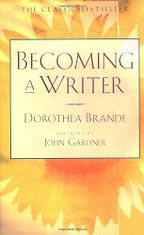
Becoming a Writer by Dorothea Brande
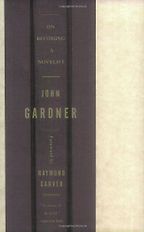
On Becoming a Novelist by John C. Gardner
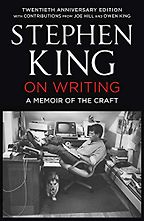
On Writing: A Memoir of the Craft by Stephen King
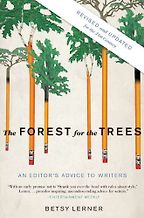
The Forest for the Trees by Betsy Lerner
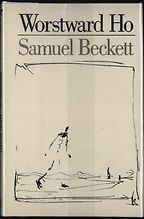
Worstward Ho by Samuel Beckett

1 Becoming a Writer by Dorothea Brande
2 on becoming a novelist by john c. gardner, 3 on writing: a memoir of the craft by stephen king, 4 the forest for the trees by betsy lerner, 5 worstward ho by samuel beckett.
How would you describe creative writing?
But because it is in academia there is all this paraphernalia that has to go with it. So you get credits for attending classes. You have to do supporting modules; you have to be assessed. If you are doing an undergraduate degree you have to follow a particular curriculum and only about a quarter of that will be creative writing and the rest will be in the canon of English literature . If you are doing a PhD you have to support whatever the creative element is with a critical element. So there are these ways in which academia disciplines writing and I think of that as Creative Writing with a capital C and a capital W. All of us who teach creative writing are doing it, in a sense, to support our writing, but it is also often at the expense of our writing. We give up quite a lot of time and mental energy and also, I think, imaginative and creative energy to teach.
Your first choice is Dorothea Brande’s Becoming a Writer , which for someone writing in 1934 sounds pretty forward thinking.
Because creative writing has now taken off and has become this very widespread academic discipline it is beginning to acquire its own canon of key works and key texts. This is one of the oldest of them. It’s a book that almost anyone who teaches creative writing will have read. They will probably have read it because some fundamentals are explained and I think the most important one is Brande’s sense of the creative writer being comprised of two people. One of them is the artist and the other is the critic.
Actually, Malcolm Bradbury who taught me at UEA, wrote the foreword to my edition of Becoming a Writer , and he talks about how Dorothea Brande was writing this book ‘in Freudian times’ – the 1930s in the States. And she does have this very Freudian idea of the writer as comprised of a child artist on the one hand, who is associated with spontaneity, unconscious processes, while on the other side there is the adult critic making very careful discriminations.
And did she think the adult critic hindered the child artist?
No. Her point is that the two have to work in harmony and in some way the writer has to achieve an effective balance between the two, which is often taken to mean that you allow the artist child free rein in the morning. So you just pour stuff on to the page in the morning when you are closest to the condition of sleep. The dream state for the writer is the one that is closest to the unconscious. And then in the afternoon you come back to your morning’s work with your critical head on and you consciously and objectively edit it. Lots of how-to-write books encourage writers to do it that way. It is also possible that you can just pour stuff on to the page for days on end as long as you come back to it eventually with a critical eye.
Get the weekly Five Books newsletter
Good! Your next book, John Gardner’s On Becoming a Novelist , is described as comfort food for the aspiring novelist.
This is another one of the classics. He was quite a successful novelist in the States, but possibly an even more successful teacher of creative writing. The short story writer and poet Raymond Carver, for instance, was one of his students. And he died young in a motorcycle accident when he was 49. There are two classic works by him. One is this book, On Becoming a Novelist , and the other is The Art of Fiction: Notes on Craft for Young Writers . They were both put together from his teaching notes after he died.
On Becoming a Novelist is the more succinct and, I think, is the better of the two. He talks about automatic writing and the idea, just like Dorothea Brande, of the artist being comprised of two people. But his key idea is the notion of the vivid and continuous dream. He suggests that when we read a novel we submit to the logic of that novel in the same way as we might submit to the logic of a dream – we sink into it, and clearly the events that occur could not exist outside the imagination.
What makes student writing in particular go wrong is when it draws attention to itself, either through bad writing or over-elaborate writing. He suggests that these faults in the aspirant writer alert the reader to the fact that they are reading a fiction and it is a bit like giving someone who is dreaming a nudge. It jolts them out of the dream. So he proposes that the student writer should try to create a dream state in the reader that is vivid and appeals to all the senses and is continuous. What you mustn’t do is alert the reader to the fact that they are reading a fiction.
It is a very good piece of advice for writers starting out but it is ultimately very limiting. It rules out all the great works of modernism and post-modernism, anything which is linguistically experimental. It rules out anything which draws attention to the words as words on a page. It’s a piece of advice which really applies to the writing of realist fiction, but is a very good place from which to begin.
And then people can move on.
I never would have expected the master of terror Stephen King to write a book about writing. But your next choice, On Writing , is more of an autobiography .
Yes. It is a surprise to a lot of people that this book is so widely read on university campuses and so widely recommended by teachers of writing. Students love it. It’s bracing: there’s no nonsense. He says somewhere in the foreword or preface that it is a short book because most books are filled with bullshit and he is determined not to offer bullshit but to tell it like it is.
It is autobiographical. It describes his struggle to emerge from his addictions – to alcohol and drugs – and he talks about how he managed to pull himself and his family out of poverty and the dead end into which he had taken them. He comes from a very disadvantaged background and through sheer hard work and determination he becomes this worldwide bestselling author. This is partly because of his idea of the creative muse. Most people think of this as some sprite or fairy that is usually feminine and flutters about your head offering inspiration. His idea of the muse is ‘a basement guy’, as he calls him, who is grumpy and turns up smoking a cigar. You have to be down in the basement every day clocking in to do your shift if you want to meet the basement guy.
Stephen King has this attitude that if you are going to be a writer you need to keep going and accept that quite a lot of what you produce is going to be rubbish and then you are going to revise it and keep working at it.
Do you agree with him?
He sounds inspirational. Your next book, Betsy Lerner’s The Forest for the Trees , looks at things from the editor’s point of view.
Yes, she was an editor at several major American publishing houses, such as Simon & Schuster. She went on to become an agent, and also did an MFA in poetry before that, so she came through the US creative writing process and understands where many writers are coming from.
The book is divided into two halves. In the second half she describes the process that goes from the completion of the author’s manuscript to submitting it to agents and editors. She explains what goes on at the agent’s offices and the publisher’s offices. She talks about the drawing up of contracts, negotiating advances and royalties. So she takes the manuscript from the author’s hands, all the way through the publishing process to its appearance in bookshops. She describes that from an insider’s point of view, which is hugely interesting.
But the reason I like this book is for the first half of it, which is very different. Here she offers six chapters, each of which is a character sketch of a different type of author. She has met each of them and so although she doesn’t mention names you feel she is revealing something to you about authors whose books you may have read. She describes six classic personality types. She has the ambivalent writer, the natural, the wicked child, the self-promoter, the neurotic and a chapter called ‘Touching Fire’, which is about the addictive and the mentally unstable.
Your final choice is Worstward Ho by Samuel Beckett .
This is a tiny book – it is only about 40 pages and it has got these massive white margins and really large type. I haven’t counted, but I would guess it is only about two to three thousand words and it is dressed up as a novella when it is really only a short story. On the first page there is this riff: ‘Ever tried. Ever failed. No matter. Try again. Fail again. Fail better.’
Support Five Books
Five Books interviews are expensive to produce. If you're enjoying this interview, please support us by donating a small amount .
When I read this I thought I had discovered a slogan for the classroom that I could share with my students. I want to encourage them to make mistakes and not to be perfectionists, not to feel that everything they do has to be of publishable standard. The whole point of doing a course, especially a creative writing MA and attending workshops, is that you can treat the course as a sandpit. You go in there, you try things out which otherwise you wouldn’t try, and then you submit it to the scrutiny of your classmates and you get feedback. Inevitably there will be things that don’t work and your classmates will help you to identify those so that you can take it away and redraft it – you can try again. And inevitably you are going to fail again because any artistic endeavour is doomed to failure because the achievement can never match the ambition. That’s why artists keep producing their art and writers keep writing, because the thing you did last just didn’t quite satisfy you, just wasn’t quite right. And you keep going and trying to improve on that.
But why, when so much of it is about failing – failing to get published, failing to be satisfied, failing to be inspired – do writers carry on?
I have a really good quote from Joseph Conrad in which he says the sitting down is all. He spends eight hours at his desk, trying to write, failing to write, foaming at the mouth, and in the end wanting to hit his head on the wall but refraining from that for fear of alarming his wife!
It’s a familiar situation; lots of writers will have been there. For me it is a kind of obsessive-compulsive disorder. It is something I have to keep returning to. I have to keep going back to the sentences, trying to get them right. Trying to line them up correctly. I can’t let them go. It is endlessly frustrating because they are never quite right.
You have published four books. Are you happy with them?
Reasonably happy. Once they are done and gone I can relax and feel a little bit proud of them. But at the time I just experience agonies. It takes me ages. It takes me four or five years to finish a novel partly because I always find distractions – like working in academia – something that will keep me away from the writing, which is equally as unrewarding as it is rewarding!
September 27, 2012
Five Books aims to keep its book recommendations and interviews up to date. If you are the interviewee and would like to update your choice of books (or even just what you say about them) please email us at [email protected]
Andrew Cowan
Andrew Cowan is Professor of Creative Writing and Director of the Creative Writing programme at UEA. His first novel, Pig , won the Sunday Times Young Writer of the Year Award, the Betty Trask Award, the Ruth Hadden Memorial Prize, the Author’s Club First Novel Award and a Scottish Council Book Award. He is also the author of the novels Common Ground , Crustaceans , What I Know and Worthless Men . His own creative writing guidebook is The Art of Writing Fiction .
We ask experts to recommend the five best books in their subject and explain their selection in an interview.
This site has an archive of more than one thousand seven hundred interviews, or eight thousand book recommendations. We publish at least two new interviews per week.
Five Books participates in the Amazon Associate program and earns money from qualifying purchases.
© Five Books 2024
- International edition
- Australia edition
- Europe edition

You’ve got style: Brilliant books on creative writing
From Italo Calvino to Dorothea Brande, Emma Cummins reflects on the books that inspire her as a writer
“There’s nothing mysterious about your prose style,” says the author Kevin Barry, “it’s a direct projection of your personality”. Many writers – myself included – find this out the hard way. Good writing is true and authentic, it reflects who you are.
For a long time, I subconsciously tried to be someone else on the page. I anglicised my Northern Irish accent; I feigned a kind of seriousness, perhaps in the hope I’d be taken seriously. But the more I attended writing workshops and read books on the craft, the more I realised my work paled beside my personality.
I am a friendly Northern Irish woman. I do a good line in anxiety but I’m not overly serious. I’m passionate about art and books. I’m not shy with strangers. Why, then, was I shy about expressing myself in my writing? There’s no easy answer to this question but I find it interesting to think about. For Guardian Masterclasses’s online summer writers’ retreat , I’ll be sharing my thoughts on style and encouraging other writers to embrace their individuality.
This blog post brings together some brilliant books on creative writing , including The Agony and the Ego , a 1993 anthology edited by Clare Boylan. In her introduction, Boylan makes an interesting observation about writing fiction. “Writing is a paradox because all of it comes out of ourselves. There is nowhere else for it to come from. Yet when the characters of a novel have been established the fiction writer’s task is to remove himself and his influence, and let the characters get on with their lives.”
At the online retreat , I’ll invite writers to think about the fruitful tension between expressing their personality in their work and being true to their characters. There are many other tutors taking part in the retreat, which runs from Monday 25 July over the course of three weeks.
From Ross Raisin to Huma Qureshi, acclaimed authors will help you fine-tune your craft and encourage you to dedicate time to writing. By the end of the three weeks, perhaps you’ll be a bit closer to what the great John McGahern described as “that clear mirror that is called style – the reflection of personality in language”.
Zen in the Art of Writing by Ray Bradbury
If you’re looking for motivation to write, this zesty book by Ray Bradbury is the perfect prescription.
In the opening essay, The Joy of Writing , the acclaimed author of Fahrenheit 451 urges us to write with zest and gusto. “If you are writing without zest, without gusto, without love, without fun, you are only half a writer. It means you are so busy keeping one eye on the commercial market, or one ear peeled for the avant-garde coterie, that you are not being yourself. You don’t even know yourself. For the first thing a writer should be is – excited.”
When I first read Zen in the Art of Writing , I felt energised to write. With essays ranging from How to Keep and Feed a Muse to Drunk, And in Charge of a Bicycle , Bradbury’s unforgettable book is a gift to anyone who loves writing. Actually, scratch that: Zen in the Art of Writing is for anyone who loves life.
Six Memos for the Next Millennium by Italo Calvino
Due to be delivered as lectures at Harvard, Italo Calvino’s delightful “memos” on writing were left unfinished at the time of his death.
The drafts explore the concepts of Lightness, Quickness, Multiplicity, Exactitude and Visibility (Constancy was to be the sixth), with Calvino beginning work on them in 1984.
In each of his lectures, Calvino recommends to the next millennium a particular value, quality or peculiarity of literature that is close to his heart. “From my youth on, my personal motto has been the old Latin tag, Festina lente , hurry slowly,” writes Calvino in his second essay, Quickness . “Just as for the poet writing verse, so it is for the prose writer: success consists in felicity of verbal expression, which every so often may result from a quick flash of inspiration but as a rule involves a patient search for the mot juste , for the sentence in which every word is unalterable”.
Calvino believes that writing prose shouldn’t be any different to writing poetry. In both cases, he argues, it’s about looking for “the unique expression”, one that is “concise, concentrated, and memorable” – three words that encapsulate the tone of this wonderful book.
The Agony and the Ego edited by Clare Boylan
In this illuminating anthology of essays, some of the finest writers of all time – from John McGahern to Hilary Mantel – reflect on the process of creating fiction.
According to editor Clare Boylan , Mantel’s reassuring essay Growing a Tale “argues that ideas coaxed rather than bullied will grow naturally into a novel”. I loved Mantel’s essay when I first read it as part of Ross Raisin’s six-week creative writing programme . “If you make your characters properly they will simply do what is within them,” writes Mantel, “they’ll act out the nature you have given them, and there – you’ll find – you have your plot.”
Now out of print, The Agony and the Ego is worth tracking down secondhand or in a library. In addition to insightful essays by John Banville, Rose Tremain and Nadine Gordimer, it features a short selection of interviews from the series Writers at Work, which Boylan wrote for the Guardian.
Many of these essays highlight “the mystery” of writing, and perhaps this is why I return to The Agony and the Ego . This warm-hearted book encourages writers to grow naturally into themselves.
Becoming a Writer by Dorothea Brande
Mantel’s rules for writers include this recommendation: “Read Becoming a Writer by Dorothea Brande. Then do what it says, including the tasks you think are impossible.”
Full of practical advice for time-poor writers, Brande’s book was first published in 1934 and remains a go-to classic. Schedule time to write each day, suggests Brande. “It need not be a very long time; fifteen minutes will do nicely”.
I enjoyed Brande’s simple but powerful advice to take a rough draft of a story “out for a walk” and think about it. After the walk, you’re invited to go to a dim room and lie down. “Quiet your mind,” says Brande. Lie there, not quite asleep, not quite awake.” After a while, she says, you’ll feel “a definite impulse to rise, a kind of surge of energy. Obey it at once … Get up and go to your paper or typewriter, and begin to write. The state you are in at that moment is the state an artist works in.”
On Editing by Helen Corner-Bryant and Kathryn Price
Writing is re-writing. Learning how to self-edit your work is perhaps the most vital skill any writer can learn and this book, by editors Helen Corner-Bryant and Kathryn Price, is something of a godsend.
One of the chapters in On Editing demystifies ‘show don’t tell’, a phrase “often misunderstood” by new writers. “At its simplest, the aim of showing is to bring the reader as close as possible to the action,” write the authors. “By feeling your writing intensely yourself you’ll transmit that emotion to the reader … and when you can make the reader feel, you’ve got them in the palm of your hand”.
Other useful chapters cover structure, description, pacing and much more. The book also includes advice on submitting your novel – from writing synopses to pitching to agents – making it an indispensable guide for writers who take their work seriously.
Writing a Novel by Richard Skinner
“When we talk about a writer’s style, what we are really talking about is their ‘voice’,” writes Richard Skinner in Writing a Novel . “As a tutor, I can do nothing about the tone of your voice as you speak, but what I can engage with is what you say, i.e. your ‘story’”.
Skinner’s book is a thought-provoking and practical guide to the craft of writing. Divided into bite-sized sections – from point of view to story and plot – it encourages writers to bring their whole selves to the page. As Skinner writes in a piece for the Observer , “Writing is about claiming ownership of yourself in order to become the person you know you can be”.
Throughout Writing a Novel , there are thoughtfully selected quotes from authors, such as Gertrude Stein’s, “Sentences are factual, but paragraphs are emotional”. Over the years, I’ve enjoyed going back to this generous, kind-spirited book. It feels fresh each time – and will no doubt inspire many writers to follow their passion.
Being a Writer by Travis Elborough and Helen Gordon
I treated myself to this beautiful gift book when I was low on confidence as a writer.
Lockdown had taken away my beloved book events and writing workshops, and while I attended many online, I was Zoom fatigued and starved of new experiences. That awful winter lockdown had been announced and I was living alone. Being a Writer was brilliant company then, and continues to be a source of insight and wisdom on the art of writing.
From Alice Munro to Gabriel García Márquez, the book features quotations and essays from some of the world’s greatest authors. Márquez reveals how the opening line of Franz Kafka’s The Metamorphosis inspired him to start writing short stories. Australian author Tim Winton says writing a book is a bit like surfing, “Most of the time you’re waiting.”
Being a Writer is a lovely anthology to dip in and out of, to savour in small bursts. This comforting book reminds us that each writer’s approach is unique. Trust in the process that works for you. Read widely, and write what makes you feel most alive. In the words of Anaïs Nin, “We write to taste life twice”.
Save up to 13% on a specially curated selection of creative writing books at the Guardian Bookshop.
Find out more about Guardian Masterclasses’s summer writer’s retreat and enrol now.
- Guardian Masterclasses
- Guardian Masterclasses blog
Most viewed

Hemingway's Books and Records
Creative Writing Books: A Curated 2024 Updated List
If you’re a writer looking to sharpen your skills, you’ll want to check out these 20 best books about creative writing. Whether you’re a seasoned novelist or just starting out, these books on creative writing offer valuable insights, exercises, and inspiration to help you unleash your creativity and improve your writing craft. From classic guides to contemporary must-reads, this list has something for every aspiring writer. Let’s dive into the world of creative writing books and discover the essential tools for honing your literary talent.
- 1 20 Best Books About Creative Writing
- 2 On Writing: A Memoir of the Craft
- 3 Bird by Bird: Some Instructions on Writing and Life
- 4 The Elements of Style
- 5 Big Magic: Creative Living Beyond Fear
- 6 The Writing Life
- 7 Zen in the Art of Writing
- 8 The Artist’s Way: A Spiritual Path to Higher Creativity
- 9 Writing Down the Bones: Freeing the Writer Within
- 10 The War of Art: Break Through the Blocks and Win Your Inner Creative Battles
- 11 The Creative Habit: Learn It and Use It for Life
- 12 The Right to Write: An Invitation and Initiation into the Writing Life
- 13 The Writing Book: A Workbook for Fiction Writers
- 14 The Art of Fiction: Notes on Craft for Young Writers
- 15 The Writing Life: Writers on How They Think and Work
- 16 The Creative Writer’s Survival Guide: Advice from an Unrepentant Novelist
- 17 The Making of a Story: A Norton Guide to Creative Writing
- 18 The Art of X-Ray Reading: How the Secrets of 25 Great Works of Literature Will Improve Your Writing
- 19 Steering the Craft: A Twenty-First-Century Guide to Sailing the Sea of Story
- 20 Story: Substance, Structure, Style, and the Principles of Screenwriting
- 21 The War of Art: Break Through the Blocks & Win Your Inner Creative Battles
- 22 Conclusion
20 Best Books About Creative Writing

See Best Deals
On Writing: A Memoir of the Craft
By stephen king.
On Writing: A Memoir of the Craft is a captivating book about the art of storytelling and the life of a prolific writer, Stephen King . In this compelling memoir, King shares his personal journey as a writer, from his early struggles to his eventual success. The book provides invaluable insights into the creative process, offering practical advice on honing one’s craft and developing a unique voice. King’s honest and straightforward narrative style makes this book about creative writing both informative and entertaining. Whether you’re an aspiring writer or a fan of King’s work, this creative writing book is a must-read for anyone interested in the art and craft of storytelling.

Bird by Bird: Some Instructions on Writing and Life
By anne lamott.
Bird by Bird: Some Instructions on Writing and Life by Anne Lamott is a beloved book on creative writing that offers practical advice and humorous insights for aspiring writers. Lamott shares her personal experiences and wisdom on the creative process, tackling self-doubt, and finding inspiration. The book about creative writing encourages writers to embrace their imperfections and to approach their work with patience and perseverance. With its warm and candid tone, this creative writing book is an invaluable resource for anyone looking to navigate the challenges of the writing life while honing their craft. Whether you’re a seasoned writer or just starting out, Bird by Bird provides a wealth of encouragement and guidance for the creative journey.

The Elements of Style
By william strunk jr. and e.b. white.
The Elements of Style, written by William Strunk Jr. and later revised and expanded by E.B. White, is a classic book on creative writing. This timeless guidebook is essential for anyone looking to improve their writing skills. It covers everything from grammar and punctuation to style and composition, providing clear and practical advice for crafting clear and impactful prose. The book about creative writing is concise and easy to follow, making it a valuable resource for writers of all levels. Whether you’re a student, professional writer, or just someone who wants to communicate more effectively, The Elements of Style is an indispensable tool for honing your craft and mastering the art of storytelling.
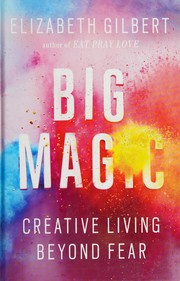
Big Magic: Creative Living Beyond Fear
By elizabeth gilbert.
Big Magic: Creative Living Beyond Fear by Elizabeth Gilbert is a captivating book about creative writing. Gilbert, the author of Eat, Pray, Love, explores the mysterious and inspiring world of creativity in this book. She shares her wisdom and insights on how to live a creative life without succumbing to fear. With a blend of personal anecdotes, practical advice, and profound observations, Gilbert encourages readers to embrace their curiosity, let go of perfectionism, and pursue their creative passions wholeheartedly. Whether you’re a writer, artist, or simply someone who craves a more fulfilling and imaginative life, this creative writing book offers a fresh perspective on the creative process and the courage required to bring your ideas to life. Big Magic is a must-read for anyone seeking inspiration and guidance on their creative journey.
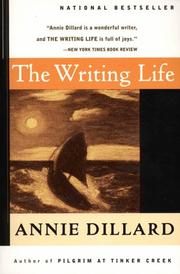
The Writing Life
By annie dillard.
The Writing Life by Annie Dillard is a captivating book on creative writing that takes readers on a journey into the world of writing. Dillard offers a unique perspective on the challenges and rewards of the writing life, drawing from her own experiences as a renowned author. Through beautiful prose and insightful observations, she explores the craft of writing, the solitary nature of the creative process, and the relentless pursuit of perfection. This book about creative writing is filled with wisdom and inspiration, making it a must-read for aspiring writers and anyone interested in the art of storytelling. Dillard’s eloquent reflections will resonate with anyone who has ever grappled with the complexities of the writing life, making it an essential addition to any writer’s library.

Zen in the Art of Writing
By ray bradbury.
Zen in the Art of Writing by Ray Bradbury is a timeless classic that delves into the essence of the creative process. This book about creative writing is a collection of essays that offer insights, encouragement, and practical advice for aspiring writers. Bradbury’s passion for storytelling and his unique approach to the craft of writing are evident in every page, making it a must-read for anyone interested in honing their craft. Through his vivid prose and heartfelt anecdotes, he inspires readers to embrace their creativity and pursue their writing dreams with zeal. Zen in the Art of Writing is a captivating and enlightening guide that celebrates the joy and magic of the written word, making it an essential addition to any writer’s bookshelf.
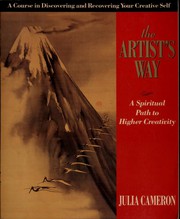
The Artist’s Way: A Spiritual Path to Higher Creativity
By julia cameron.
The Artist’s Way by Julia Cameron is a transformative book on creative writing that guides readers on a spiritual journey to unlock their creativity. Cameron presents a 12-week program designed to help individuals overcome creative blocks, self-doubt, and fear, and tap into their innate creativity. Through a series of exercises and reflections, readers learn to cultivate a sense of curiosity, playfulness, and self-expression to unleash their creative potential. With its practical techniques and insightful wisdom, this book about creative writing has been a go-to resource for artists, writers, and anyone seeking to live a more creative and fulfilling life. The Artist’s Way is a must-read for anyone looking to reignite their passion for creative expression and reconnect with their artistic side.
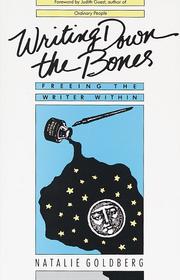
Writing Down the Bones: Freeing the Writer Within
By natalie goldberg.
Writing Down the Bones: Freeing the Writer Within by Natalie Goldberg is a beloved book on creative writing that has inspired countless writers to tap into their creativity and find their authentic voice. In this classic book about creative writing, Goldberg shares her wisdom and experience as a writer and writing teacher, offering practical advice and insightful exercises to help writers overcome self-doubt and unleash their creativity. Through her candid and engaging writing style, she encourages readers to embrace the practice of writing as a way of life, emphasizing the importance of discipline, observation, and fearlessness. Whether you’re a seasoned writer or just starting out, this creative writing book is a valuable resource for anyone looking to deepen their connection to the written word and cultivate a more meaningful and fulfilling writing practice.
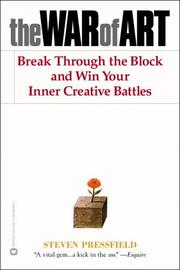
The War of Art: Break Through the Blocks and Win Your Inner Creative Battles
By steven pressfield.
The War of Art by Steven Pressfield is a powerful and inspiring book about the challenges and obstacles that creative individuals face in their pursuit of artistic expression. Pressfield delves into the concept of ‘resistance’ – the internal force that prevents us from reaching our true creative potential. Through a series of insightful essays, he provides valuable advice on how to overcome this resistance and break through the barriers that hinder our creativity. This book is a must-read for anyone struggling with their creative endeavors, as it offers practical strategies and encouragement to help readers win their inner creative battles. Whether you’re a writer, artist, musician, or any other type of creative professional, The War of Art is an essential resource for understanding and conquering the obstacles that stand in the way of your artistic fulfillment.
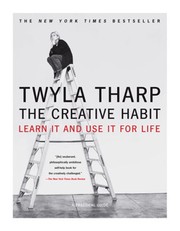
The Creative Habit: Learn It and Use It for Life
By twyla tharp.
The Creative Habit by Twyla Tharp is a must-read for anyone looking to enhance their artistic practice. This insightful book on creative writing delves into the habits and routines that can cultivate creativity for a lifetime. Twyla Tharp, a renowned choreographer, shares her personal experiences and provides practical advice on how to harness creativity through discipline and dedication. She emphasizes the importance of establishing a daily routine and developing rituals to spark inspiration. Tharp’s unique perspective and engaging writing style make this a valuable resource for both aspiring and experienced creators. Whether you’re a writer, artist, or musician, this book about creative writing will inspire you to tap into your creative potential and establish a sustainable creative practice.
Recommended for you:

The Right to Write: An Invitation and Initiation into the Writing Life
The Right to Write: An Invitation and Initiation into the Writing Life by Julia Cameron is a compelling and inspiring book about creative writing. Cameron, known for her bestseller The Artist’s Way, encourages readers to embrace their natural creativity and overcome the fear of writing. She provides practical exercises and insights to help aspiring writers unlock their potential and find their unique voice. The book explores the joy of creative writing and the importance of self-expression, offering guidance on how to cultivate a regular writing practice and overcome common obstacles. With warmth and wisdom, Cameron invites readers to explore the power of writing and discover the transformative impact it can have on their lives. Whether you’re a seasoned writer or just starting out, The Right to Write is a valuable resource for anyone looking to unleash their creativity and embrace the writing life.
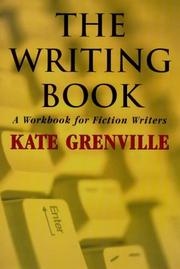
The Writing Book: A Workbook for Fiction Writers
By kate grenville.
The Writing Book: A Workbook for Fiction Writers by Kate Grenville is a comprehensive guide for aspiring writers looking to enhance their storytelling skills. This book on creative writing offers practical exercises and insightful advice to help writers develop their craft and create compelling works of fiction. Grenville’s approach is both informative and engaging, providing valuable techniques for character development, plot structure, and narrative voice. Whether you’re a beginner or seasoned writer, this book about creative writing is a valuable resource for honing your skills and unleashing your creativity. With its practical exercises and expert guidance, The Writing Book is a must-have for anyone looking to elevate their storytelling abilities and produce captivating fiction.

The Art of Fiction: Notes on Craft for Young Writers
By john gardner.
The Art of Fiction: Notes on Craft for Young Writers by John Gardner is a classic book on creative writing that provides insightful guidance for aspiring writers. Gardner, a renowned novelist and writing instructor, delves into the essential elements of storytelling, such as character development, plot structure, and narrative craft. Through clear and practical advice, he offers valuable tips for honing one’s writing skills and creating compelling fiction. This book about creative writing is a treasure trove of wisdom for writers of all levels, as Gardner’s engaging prose and thoughtful analysis illuminate the art of storytelling. Whether you’re a novice writer seeking guidance or a seasoned wordsmith looking to refine your craft, The Art of Fiction is an indispensable resource for anyone passionate about the creative writing process.
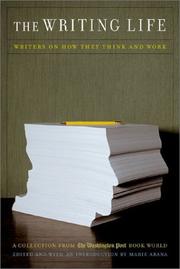
The Writing Life: Writers on How They Think and Work
By marie arana.
The Writing Life: Writers on How They Think and Work by Marie Arana is a captivating book about creative writing that offers a rare glimpse into the minds of some of the world’s most renowned authors. Through a series of intimate interviews, Arana explores the writing process and the various techniques and rituals that different writers employ to bring their stories to life. The book delves into the creative process and provides valuable insights and inspiration for aspiring writers. It’s a must-read for anyone interested in the writing craft and the inner workings of the literary mind. The Writing Life is a treasure trove of wisdom and advice from some of the literary world’s most esteemed figures, making it an essential addition to any creative writing book collection.
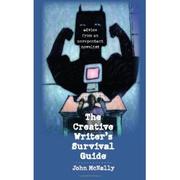
The Creative Writer’s Survival Guide: Advice from an Unrepentant Novelist
By john mcnally.
The Creative Writer’s Survival Guide: Advice from an Unrepentant Novelist by John McNally is a treasure trove for aspiring writers. This book on creative writing is filled with valuable tips and insights on the craft of storytelling, character development, and navigating the publishing industry. McNally, an accomplished novelist, shares his wisdom with wit and candor, making this a must-read for anyone serious about honing their writing skills. Whether you’re struggling with writer’s block or seeking guidance on the business side of publishing, this book about creative writing has got you covered. McNally’s unapologetic approach to the art of writing is both refreshing and inspiring, making this creative writing book a valuable resource for writers at any stage of their journey.

The Making of a Story: A Norton Guide to Creative Writing
By alice laplante.
The Making of a Story: A Norton Guide to Creative Writing by Alice LaPlante is a comprehensive and insightful book on the craft of storytelling. LaPlante offers practical advice and exercises for writers of all levels, covering the essential elements of fiction, such as character development, plot structure, and dialogue. What sets this book about creative writing apart is its emphasis on the psychology of storytelling, delving into the motivations and intentions behind a writer’s creative choices. LaPlante’s engaging and accessible style makes this creative writing book a valuable resource for aspiring writers looking to hone their skills and deepen their understanding of the storytelling process. Whether you’re a beginner or an experienced writer, The Making of a Story provides the tools and inspiration needed to embark on a literary journey.

The Art of X-Ray Reading: How the Secrets of 25 Great Works of Literature Will Improve Your Writing
By roy peter clark.
The Art of X-Ray Reading by Roy Peter Clark is a captivating book on creative writing that offers a unique approach to dissecting and understanding literature. Through the analysis of 25 classic works of literature, Clark reveals the hidden techniques and secrets that great writers use to captivate their readers. By delving into the subtext, structure, and language of these works, he provides valuable insights and practical tips that can help writers improve their own craft. This creative writing book is not just about creative writing; it’s about learning to read like a writer, to see beyond the surface and uncover the deeper layers of meaning and technique. Whether you’re an aspiring writer looking to enhance your skills or a literature enthusiast eager to gain a deeper appreciation for the art of storytelling, The Art of X-Ray Reading is a must-read.
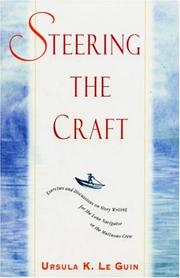
Steering the Craft: A Twenty-First-Century Guide to Sailing the Sea of Story
By ursula k. le guin.
Steering the Craft is a renowned book on creative writing written by the legendary Ursula K. Le Guin . This comprehensive and engaging book about creative writing provides valuable insights and techniques for navigating the complexities of storytelling. Le Guin’s expertise and passion for the craft shine through as she delves into the essential elements of writing, such as voice, style, and point of view. Through thought-provoking exercises and illuminating examples, she guides writers on a transformative journey through the sea of story, empowering them to hone their skills and craft compelling narratives. Whether you’re a novice writer or a seasoned wordsmith, this creative writing book is an indispensable resource that will inspire and elevate your storytelling prowess.
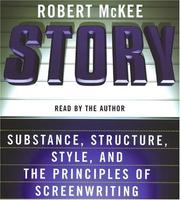
Story: Substance, Structure, Style, and the Principles of Screenwriting
By robert mckee.
Robert McKee’s “Story: Substance, Structure, Style, and the Principles of Screenwriting” is a renowned book on creative writing that delves into the art of crafting compelling narratives. McKee provides a comprehensive overview of the principles of storytelling, exploring the essential elements of substance, structure, and style. With a focus on screenwriting, the book offers valuable insights into character development, plot construction, and dialogue, making it an indispensable resource for writers looking to enhance their storytelling skills. McKee’s engaging writing style and in-depth analysis of successful storytelling make this book about creative writing a must-read for aspiring writers and seasoned authors alike. Whether you’re a screenwriter, novelist, or simply passionate about the craft of storytelling, “Story” is a creative writing book that will inspire and inform your writing journey.

The War of Art: Break Through the Blocks & Win Your Inner Creative Battles
The War of Art by Steven Pressfield is a powerful and inspiring book on creative writing that delves into the internal battles faced by every artist. Pressfield identifies the enemy as Resistance, which manifests as self-doubt, procrastination, and fear of failure. He presents practical strategies to overcome Resistance and unleash one’s creative potential. The book offers a no-nonsense approach to tackling the obstacles that stand in the way of artistic expression, making it a must-read for anyone struggling with their creative endeavors. With its profound insights and motivational tone, this book about creative writing is a valuable resource for writers, artists, and anyone seeking to break through their inner creative battles and fulfill their creative potential.
In conclusion, the world of Creative Writing is vast and diverse, and there are countless books about creative writing that can inspire and guide both aspiring and seasoned writers. Whether you’re looking for practical advice, creative prompts, or insight into the writing process, the 20 books listed in this article are excellent resources to add to your reading list. From classic texts to contemporary guides, there’s something for every writer to explore and learn from. Happy reading and happy writing!
Which Creative Writing book is best?
The best book on Creative Writing can vary with personal preference, but three widely recommended titles are:
- On Writing: A Memoir of the Craft by Stephen King ,
- Bird by Bird: Some Instructions on Writing and Life by Anne Lamott ,
- The Elements of Style by William Strunk Jr. and E.B. White .
Each offers valuable insights and could be a great starting point.
What are the best books to learn about Creative Writing?
For those looking to learn about Creative Writing, there is a wealth of literature that can provide a comprehensive understanding of the subject. Some of the most highly recommended books include:
- The Elements of Style by William Strunk Jr. and E.B. White ,
- Big Magic: Creative Living Beyond Fear by Elizabeth Gilbert ,
- The Writing Life by Annie Dillard ,
- Zen in the Art of Writing by Ray Bradbury ,
- The Artist’s Way: A Spiritual Path to Higher Creativity by Julia Cameron ,
- Writing Down the Bones: Freeing the Writer Within by Natalie Goldberg ,
- The War of Art: Break Through the Blocks and Win Your Inner Creative Battles by Steven Pressfield ,
- The Creative Habit: Learn It and Use It for Life by Twyla Tharp
These books offer a range of perspectives on Creative Writing, covering various aspects and approaches to the subject.
What are the best books on Creative Writing?
The best books on Creative Writing include:
- The Right to Write: An Invitation and Initiation into the Writing Life by Julia Cameron ,
- The Writing Book: A Workbook for Fiction Writers by Kate Grenville ,
- Zen in the Art of Writing by Ray Bradbury .
Each offers unique insights into the subject. While these books on the topic of Creative Writing are highly regarded, it’s important to note that any list of ‘best’ books is subjective and reflects a range of opinions.
What are the best Creative Writing books of all time?
Choosing the best Creative Writing books of all time can vary depending on who you ask, but seven titles that are often celebrated include
- The Creative Habit: Learn It and Use It for Life by Twyla Tharp ,
- and The Right to Write: An Invitation and Initiation into the Writing Life by Julia Cameron .
Each of these books has made a significant impact in the field of Creative Writing and continues to be influential today.
Related posts:

Elements of Creative Writing
J.D. Schraffenberger, University of Northern Iowa
Rachel Morgan, University of Northern Iowa
Grant Tracey, University of Northern Iowa
Copyright Year: 2023
ISBN 13: 9780915996179
Publisher: University of Northern Iowa
Language: English
Formats Available
Conditions of use.
Learn more about reviews.
Reviewed by Robert Moreira, Lecturer III, University of Texas Rio Grande Valley on 3/21/24
Unlike Starkey's CREATIVE WRITING: FOUR GENRES IN BRIEF, this textbook does not include a section on drama. read more
Comprehensiveness rating: 4 see less
Unlike Starkey's CREATIVE WRITING: FOUR GENRES IN BRIEF, this textbook does not include a section on drama.
Content Accuracy rating: 5
As far as I can tell, content is accurate, error free and unbiased.
Relevance/Longevity rating: 5
The book is relevant and up-to-date.
Clarity rating: 5
The text is clear and easy to understand.
Consistency rating: 5
I would agree that the text is consistent in terms of terminology and framework.
Modularity rating: 5
Text is modular, yes, but I would like to see the addition of a section on dramatic writing.
Organization/Structure/Flow rating: 5
Topics are presented in logical, clear fashion.
Interface rating: 5
Navigation is good.
Grammatical Errors rating: 5
No grammatical issues that I could see.
Cultural Relevance rating: 3
I'd like to see more diverse creative writing examples.
As I stated above, textbook is good except that it does not include a section on dramatic writing.
Table of Contents
- Introduction
- Chapter One: One Great Way to Write a Short Story
- Chapter Two: Plotting
- Chapter Three: Counterpointed Plotting
- Chapter Four: Show and Tell
- Chapter Five: Characterization and Method Writing
- Chapter Six: Character and Dialouge
- Chapter Seven: Setting, Stillness, and Voice
- Chapter Eight: Point of View
- Chapter Nine: Learning the Unwritten Rules
- Chapter One: A Poetry State of Mind
- Chapter Two: The Architecture of a Poem
- Chapter Three: Sound
- Chapter Four: Inspiration and Risk
- Chapter Five: Endings and Beginnings
- Chapter Six: Figurative Language
- Chapter Seven: Forms, Forms, Forms
- Chapter Eight: Go to the Image
- Chapter Nine: The Difficult Simplicity of Short Poems and Killing Darlings
Creative Nonfiction
- Chapter One: Creative Nonfiction and the Essay
- Chapter Two: Truth and Memory, Truth in Memory
- Chapter Three: Research and History
- Chapter Four: Writing Environments
- Chapter Five: Notes on Style
- Chapter Seven: Imagery and the Senses
- Chapter Eight: Writing the Body
- Chapter Nine: Forms
Back Matter
- Contributors
- North American Review Staff

Ancillary Material
- University of Northern Iowa
About the Book
This free and open access textbook introduces new writers to some basic elements of the craft of creative writing in the genres of fiction, poetry, and creative nonfiction. The authors—Rachel Morgan, Jeremy Schraffenberger, and Grant Tracey—are editors of the North American Review, the oldest and one of the most well-regarded literary magazines in the United States. They’ve selected nearly all of the readings and examples (more than 60) from writing that has appeared in NAR pages over the years. Because they had a hand in publishing these pieces originally, their perspective as editors permeates this book. As such, they hope that even seasoned writers might gain insight into the aesthetics of the magazine as they analyze and discuss some reasons this work is so remarkable—and therefore teachable. This project was supported by NAR staff and funded via the UNI Textbook Equity Mini-Grant Program.
About the Contributors
J.D. Schraffenberger is a professor of English at the University of Northern Iowa. He is the author of two books of poems, Saint Joe's Passion and The Waxen Poor , and co-author with Martín Espada and Lauren Schmidt of The Necessary Poetics of Atheism . His other work has appeared in Best of Brevity , Best Creative Nonfiction , Notre Dame Review , Poetry East , Prairie Schooner , and elsewhere.
Rachel Morgan is an instructor of English at the University of Northern Iowa. She is the author of the chapbook Honey & Blood , Blood & Honey . Her work is included in the anthology Fracture: Essays, Poems, and Stories on Fracking in American and has appeared in the Journal of American Medical Association , Boulevard , Prairie Schooner , and elsewhere.
Grant Tracey author of three novels in the Hayden Fuller Mysteries ; the chapbook Winsome featuring cab driver Eddie Sands; and the story collection Final Stanzas , is fiction editor of the North American Review and an English professor at the University of Northern Iowa, where he teaches film, modern drama, and creative writing. Nominated four times for a Pushcart Prize, he has published nearly fifty short stories and three previous collections. He has acted in over forty community theater productions and has published critical work on Samuel Fuller and James Cagney. He lives in Cedar Falls, Iowa.
Contribute to this Page
We will keep fighting for all libraries - stand with us!
Internet Archive Audio

- This Just In
- Grateful Dead
- Old Time Radio
- 78 RPMs and Cylinder Recordings
- Audio Books & Poetry
- Computers, Technology and Science
- Music, Arts & Culture
- News & Public Affairs
- Spirituality & Religion
- Radio News Archive

- Flickr Commons
- Occupy Wall Street Flickr
- NASA Images
- Solar System Collection
- Ames Research Center

- All Software
- Old School Emulation
- MS-DOS Games
- Historical Software
- Classic PC Games
- Software Library
- Kodi Archive and Support File
- Vintage Software
- CD-ROM Software
- CD-ROM Software Library
- Software Sites
- Tucows Software Library
- Shareware CD-ROMs
- Software Capsules Compilation
- CD-ROM Images
- ZX Spectrum
- DOOM Level CD

- Smithsonian Libraries
- FEDLINK (US)
- Lincoln Collection
- American Libraries
- Canadian Libraries
- Universal Library
- Project Gutenberg
- Children's Library
- Biodiversity Heritage Library
- Books by Language
- Additional Collections

- Prelinger Archives
- Democracy Now!
- Occupy Wall Street
- TV NSA Clip Library
- Animation & Cartoons
- Arts & Music
- Computers & Technology
- Cultural & Academic Films
- Ephemeral Films
- Sports Videos
- Videogame Videos
- Youth Media
Search the history of over 866 billion web pages on the Internet.
Mobile Apps
- Wayback Machine (iOS)
- Wayback Machine (Android)
Browser Extensions
Archive-it subscription.
- Explore the Collections
- Build Collections
Save Page Now
Capture a web page as it appears now for use as a trusted citation in the future.
Please enter a valid web address
- Donate Donate icon An illustration of a heart shape
The Cambridge Introduction to Creative Writing
Bookreader item preview, share or embed this item, flag this item for.
- Graphic Violence
- Explicit Sexual Content
- Hate Speech
- Misinformation/Disinformation
- Marketing/Phishing/Advertising
- Misleading/Inaccurate/Missing Metadata

plus-circle Add Review comment Reviews
26,515 Views
86 Favorites
DOWNLOAD OPTIONS
For users with print-disabilities
IN COLLECTIONS
Uploaded by Woodystunes on February 13, 2011
SIMILAR ITEMS (based on metadata)
🎉 Our next novel writing master class starts in – ! Claim your spot →
WEEKLY WRITING PROMPTS
Join (probably?) the world's largest writing contest. Flex those creative muscles with weekly writing prompts.
Showing 2124 prompts
The great unknown, write a narrative about a group of scientists exploring the deepest parts of the ocean..
LIVE – Adventure
Imagine a world where exploration is forbidden, and write a story about a character who defies this rule to satisfy their innate curiosity.
LIVE – Dystopian
Center your story around a character’s personal exploration, whether it's trying a new hobby, visiting an unfamiliar place, or learning something completely new.
LIVE – Character
Set your story on a spaceship exploring the far reaches of space when something goes wrong.
LIVE – Science Fiction
Write a story in the form of diary entries, written by an explorer as they make their way through what they thought was an untouched location.

Introducing Prompted , a new magazine written by you!
🏆 Featuring 12 prize-winning stories from our community. Download it now for FREE .
Write about a character who treats everything like a game and struggles to be serious when they most need to, or vice versa.
Write a story about someone who takes a joke way too far., write a story about someone participating in a seemingly innocent game that suddenly takes a turn., set your story in a playground: two characters are having a serious conversation while on the seesaw/in the jungle gym/on the swings., write a story that includes the phrase “it’s all fun and games…”, subscribe to our prompts newsletter.
Never miss a prompt! Get curated writing inspiration delivered to your inbox each week.
Set your story in a world where astrology and the movements of celestial bodies deeply impact the lives of inhabitants.
People have gathered to witness a once-in-a-lifetime natural phenomenon, but what happens next is not what they expected., imagine an origin myth that somebody might use to explain an eclipse, or some other celestial event., write a story in which a character navigates using the stars., set your story during a total eclipse — either natural, or man-made., begin or end your story with a character taking a selfie., write about a character who sees a photo they shouldn’t have seen., write a story about a character who risks their life to take a photo., start your story with a character staring at a picture they don’t remember taking., center your story around a photo that goes viral., win $250 in our short story competition 🏆.
We'll send you 5 prompts each week. Respond with your short story and you could win $250!
Contest #247 LIVE
Enter our weekly contest.
This week's theme: The Great Unknown
Prize money
Contest entries, closes at 23:59 - apr 26, 2024 est, recent contests ✍️.
#246 – All Fun and Games
#245 – Heavenly Bodies
#244 – Oh Snap!
#243 – Re-Imagining Our World Through Speculative Fiction with Alice McIlroy
Recent winners 🏆
Olivier Breuleux – read
Kerriann Murray – read
Thomas Iannucci – read
Niamh O'Dea – read
Leaderboard 🥇
#1 Zilla Babbitt
32363 points
#2 Deidra Whitt Lovegren
28700 points
#3 Abigail Airuedomwinya
22416 points
#4 Graham Kinross
14463 points
#5 Scout Tahoe
13196 points
#6 Chris Campbell
11158 points
#7 Thom With An H
10610 points
#8 Rayhan Hidayat
10212 points
#9 Michał Przywara
9885 points
#10 Deborah Mercer
9610 points

Bring your short stories to life
Fuse character, story, and conflict with tools in the Reedsy Book Editor. 100% free.
Creative Writing Prompts
When the idea to start a weekly newsletter with writing inspiration first came to us, we decided that we wanted to do more than provide people with topics to write about. We wanted to try and help authors form a regular writing habit and also give them a place to proudly display their work. So we started the weekly Creative Writing Prompts newsletter. Since then, Prompts has grown to a community of more than 450,000 authors, complete with its own literary magazine, Prompted .
Here's how our contest works: every Friday, we send out a newsletter containing five creative writing prompts. Each week, the story ideas center around a different theme. Authors then have one week — until the following Friday — to submit a short story based on one of our prompts. A winner is picked each week to win $250 and is highlighted on our Reedsy Prompts page.
Interested in participating in our short story contest? Sign up here for more information! Or you can check out our full Terms of Use and our FAQ page .
Why we love creative writing prompts
If you've ever sat in front of a computer or notebook and felt the urge to start creating worlds, characters, and storylines — all the while finding yourself unable to do so — then you've met the author's age-old foe: writer's block. There's nothing more frustrating than finding the time but not the words to be creative. Enter our directory! If you're ready to kick writer's block to the curb and finally get started on your short story or novel, these unique story ideas might just be your ticket.
This list of 1800+ creative writing prompts has been created by the Reedsy team to help you develop a rock-solid writing routine. As all aspiring authors know, this is the #1 challenge — and solution! — for reaching your literary goals. Feel free to filter through different genres, which include...
Dramatic — If you want to make people laugh and cry within the same story, this might be your genre.
Funny — Whether satire or slapstick, this is an opportunity to write with your funny bone.
Romance — One of the most popular commercial genres out there. Check out these story ideas out if you love writing about love.
Fantasy — The beauty of this genre is that the possibilities are as endless as your imagination.
Dystopian – Explore the shadowy side of human nature and contemporary technology in dark speculative fiction.
Mystery — From whodunnits to cozy mysteries, it's time to bring out your inner detective.
Thriller and Suspense — There's nothing like a page-turner that elicits a gasp of surprise at the end.
High School — Encourage teens to let their imaginations run free.
Want to submit your own story ideas to help inspire fellow writers? Send them to us here.
After you find the perfect story idea
Finding inspiration is just one piece of the puzzle. Next, you need to refine your craft skills — and then display them to the world. We've worked hard to create resources that help you do just that! Check them out:
- How to Write a Short Story That Gets Published — a free, ten-day course by Laura Mae Isaacman, a full-time editor who runs a book editing company in Brooklyn.
- Best Literary Magazines of 2023 — a directory of 100+ reputable magazines that accept unsolicited submissions.
- Writing Contests in 2023 — the finest contests of 2021 for fiction and non-fiction authors of short stories, poetry, essays, and more.
Beyond creative writing prompts: how to build a writing routine
While writing prompts are a great tactic to spark your creative sessions, a writer generally needs a couple more tools in their toolbelt when it comes to developing a rock-solid writing routine . To that end, here are a few more additional tips for incorporating your craft into your everyday life.
- NNWT. Or, as book coach Kevin Johns calls it , “Non-Negotiable Writing Time.” This time should be scheduled into your routine, whether that’s once a day or once a week. Treat it as a serious commitment, and don’t schedule anything else during your NNWT unless it’s absolutely necessary.
- Set word count goals. And make them realistic! Don’t start out with lofty goals you’re unlikely to achieve. Give some thought to how many words you think you can write a week, and start there. If you find you’re hitting your weekly or daily goals easily, keep upping the stakes as your craft time becomes more ingrained in your routine.
- Talk to friends and family about the project you’re working on. Doing so means that those close to you are likely to check in about the status of your piece — which in turn keeps you more accountable.
Arm yourself against writer’s block. Writer’s block will inevitably come, no matter how much story ideas initially inspire you. So it’s best to be prepared with tips and tricks you can use to keep yourself on track before the block hits. You can find 20 solid tips here — including how to establish a relationship with your inner critic and apps that can help you defeat procrastination or lack of motivation.
NEW VIDEO COURSE 🎉
How to Write a Novel
Join Tom Bromley for a writing master class and finish your first draft in 3 months . Learn more →
Explore more writing prompt ideas:
Adults Writing Prompts ⭢
Adventure Writing Prompts ⭢
Angst Writing Prompts ⭢
Character Writing Prompts ⭢
Christmas Writing Prompts ⭢
Dark Writing Prompts ⭢
Dialogue Writing Prompts ⭢
Dramatic Writing Prompts ⭢
Dystopian Writing Prompts ⭢
Fall Writing Prompts ⭢
Fantasy Writing Prompts ⭢
Fiction Writing Prompts ⭢
Fluff Writing Prompts ⭢
Funny Writing Prompts ⭢
Halloween Writing Prompts ⭢
High School Writing Prompts ⭢
Historical Fiction Writing Prompts ⭢
Holiday Writing Prompts ⭢
Horror Writing Prompts ⭢
Kids Writing Prompts ⭢
Middle School Writing Prompts ⭢
Mystery Writing Prompts ⭢
Narrative Writing Prompts ⭢
Nonfiction Writing Prompts ⭢
Novel Writing Prompts ⭢
Poetry Writing Prompts ⭢
Romance Writing Prompts ⭢
Sad Writing Prompts ⭢
Science Fiction Writing Prompts ⭢
Short Story Writing Prompts ⭢
Spring Writing Prompts ⭢
Summer Writing Prompts ⭢
Teens Writing Prompts ⭢
Thanksgiving Writing Prompts ⭢
Thriller and Suspense Writing Prompts ⭢
Valentine's Day Writing Prompts ⭢
Vampire Writing Prompts ⭢
Winter Writing Prompts ⭢
Oops, you need an account for that!
Log in with your social account:
Or enter your email:
- Utility Menu
Creative Writing Books
The third hotel by laura van den berg (2018).

How to Change Your Mind: What the New Science of Psychedelics Teaches Us About Consciousness, Dying, Addiction, Depression, and Transcendence by Michael Pollan (2018)
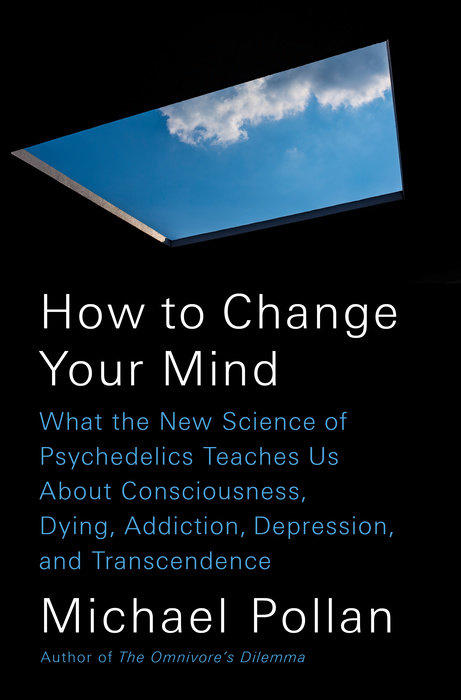
Cooked by Michael Pollan (2013)
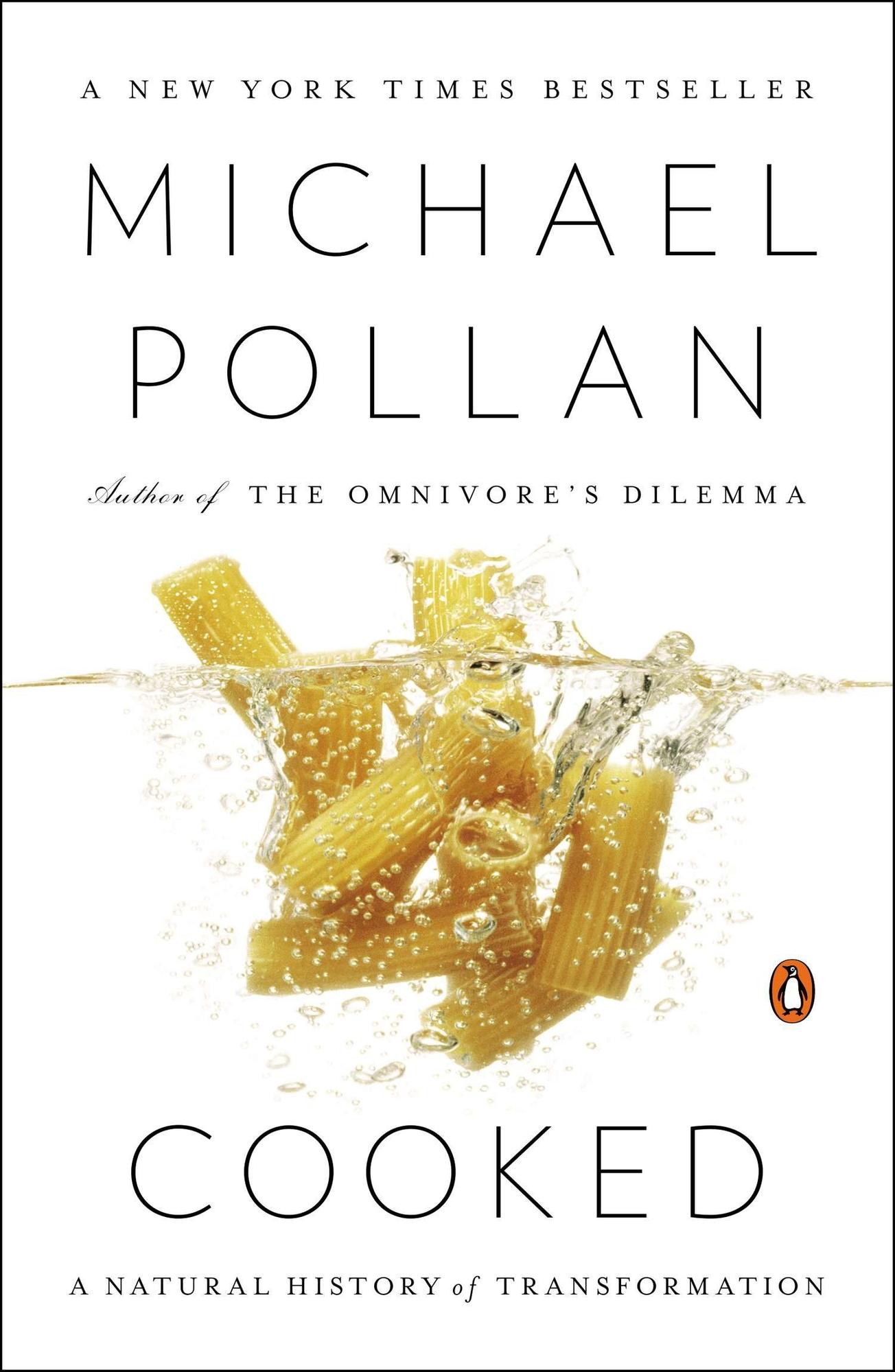
Dream Of The Unified Field by Jorie Graham (1997)
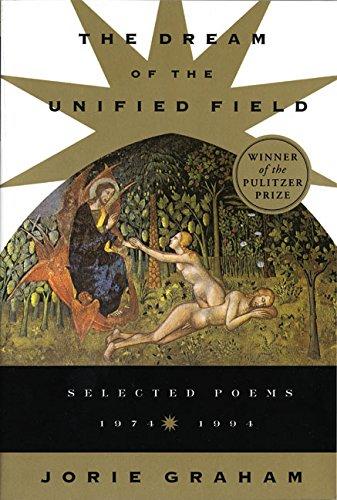
Every Day Is for the Thief by Teju Cole (2007/2014)
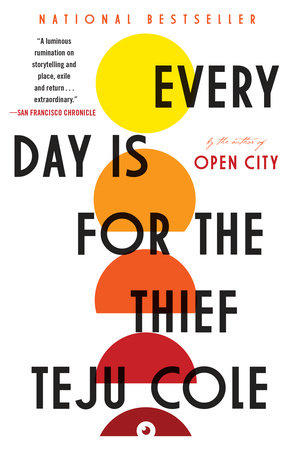
Fast by Jorie Graham (2017)
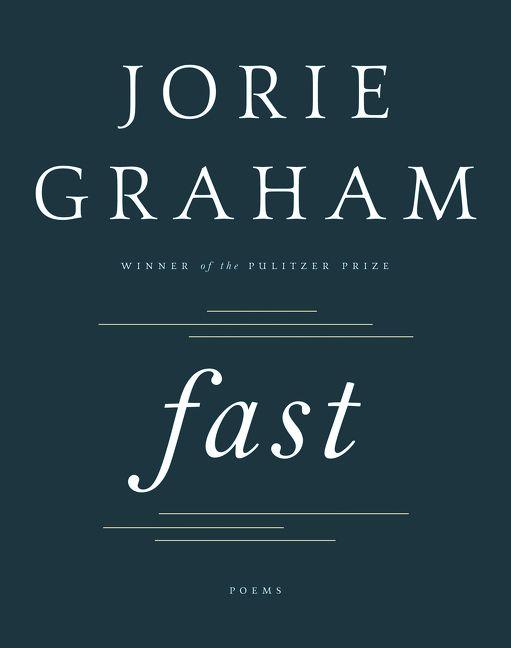
Find Me by Laura van den Berg (2015)
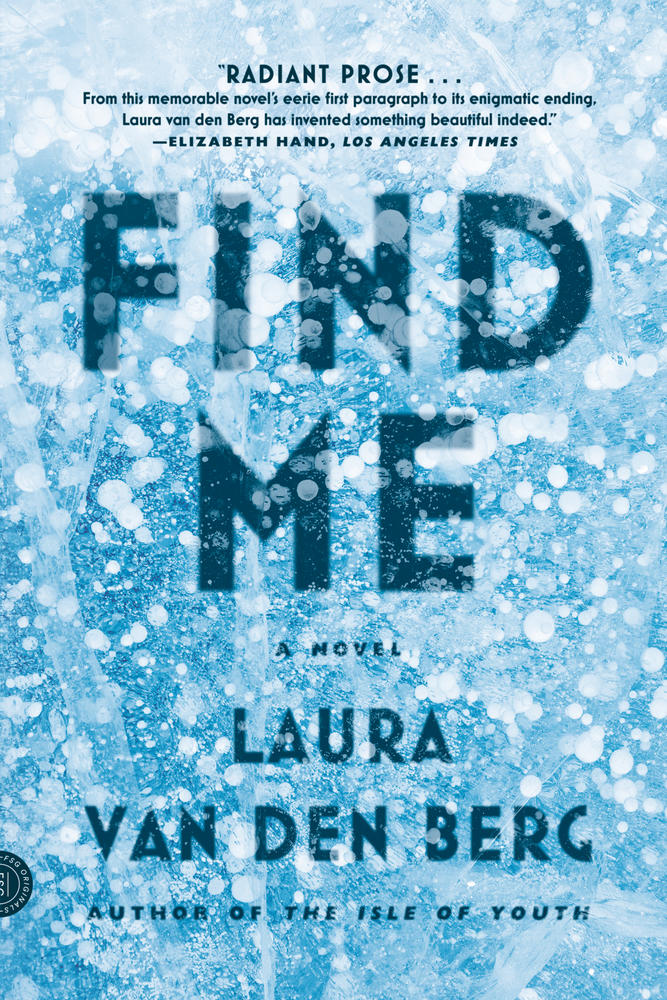
In Defense of Food by Michael Pollan (2008)
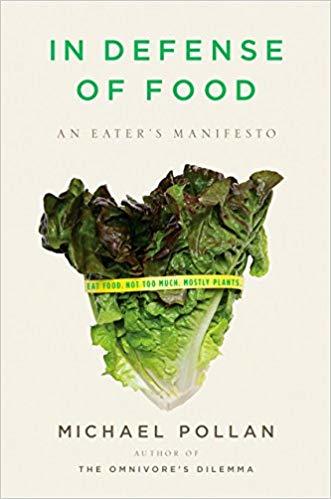
Known and Strange Things by Teju Cole (2016)

Mr. Potter by Jamaica Kincaid (2002)
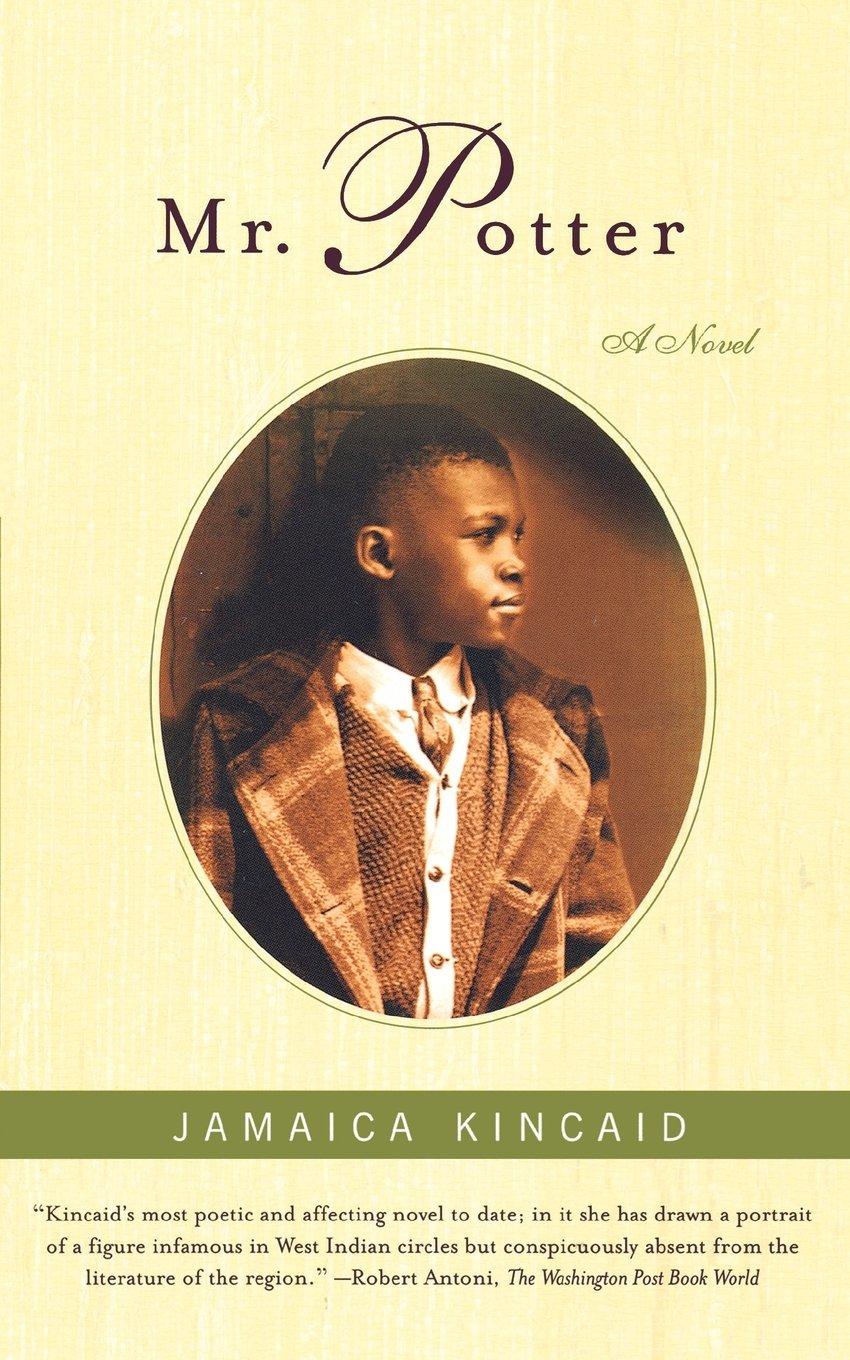
No Planets Strike by Josh Bell (2008)
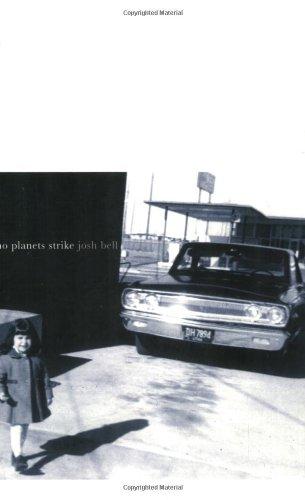
Once the Shore by Paul Yoon (2009)
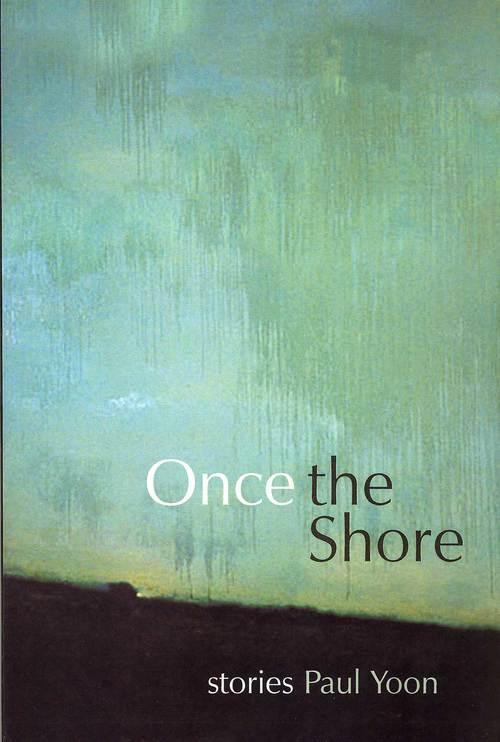
Open City by Teju Cole (2011)
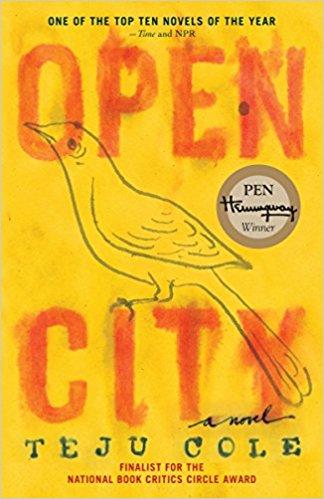
Place: New Poems by Jorie Graham (2012)

Sea Change by Jorie Graham
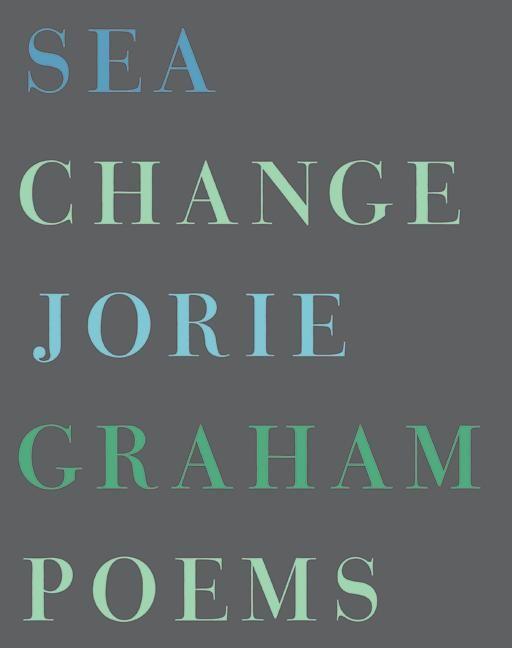
- Creative Writing Books (31)
- Course (188)

English and Creative Writing
- Reference Materials
- Find Primary Materials
- Find Research Articles
- Find Books/eBooks
- Other Helpful Resources
- Ask a Librarian
- Citation Tools

This guide is intended to help you navigate resources for English and Creative Writing at Augustana College. Here you will find information about finding research articles, books, and other helpful resources.
This guide can help you:
- Start the research process
- Identify databases specific to English and creative writing
- Find subject specific sources such as books, articles, etc.
If you feel like you need some additional help while working on assignments for your English and creative writing classes, you can reach out to the English and creative writing librarian, Kaitlyn Goss-Peirce. You can communicate with her via email ( [email protected] ) or by setting up a research consultation appointment. Research consultation appointments are typically 30 minutes long and take place in either her office or virtually. To reach out to Kaitlyn, click the email button in her profile box on this screen.
Selected New English & Creative Writing Books
- Next: Reference Materials >>
- Last Updated: Mar 6, 2024 3:26 PM
- URL: https://library.augustana.edu/englishcreativewriting
- Skip to main content
- Skip to primary sidebar
- Skip to footer
Additional menu
The Creative Penn
Writing, self-publishing, book marketing, making a living with your writing
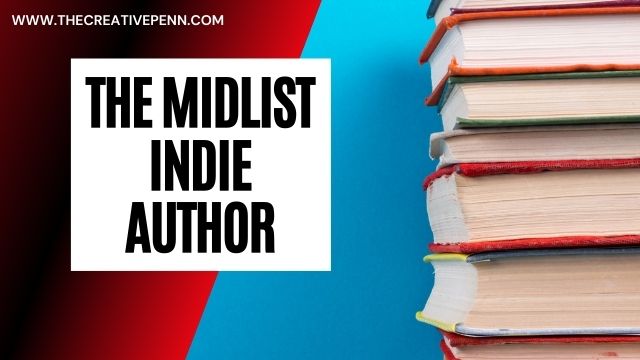
The Midlist Indie Author With T. Thorn Coyle
posted on April 22, 2024
Podcast: Download (Duration: 56:50 — 45.7MB)
Subscribe: Spotify | TuneIn | RSS | More
How can you build a creative, sustainable career as a ‘mid-list' indie author? How can you design a business that works for you and your books over the long term? T. Thorn Coyle explains more in this episode.
In the intro, BookVault bespoke printing options ; Harper Collins partners with Eleven Labs for AI-narrated non-English audiobooks [ Publishing Perspectives ]; AI Publishing Formula Podcast ; Brave New Bookshelf Podcast ; “I’m not worried about AI, because I got my mojo working.” Stephen King ;
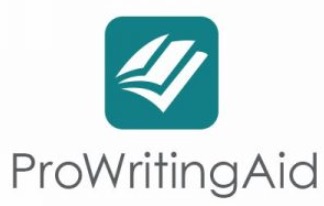
Today's show is sponsored by ProWritingAid, writing and editing software that goes way beyond just grammar and typo checking. With its detailed reports on how to improve your writing and integration with Scrivener, ProWritingAid will help you improve your book before you send it to an editor, agent or publisher. Check it out for free or get 25% off the premium edition at www.ProWritingAid.com/joanna
This show is also supported by my Patrons. Join my Community at Patreon.com/thecreativepenn
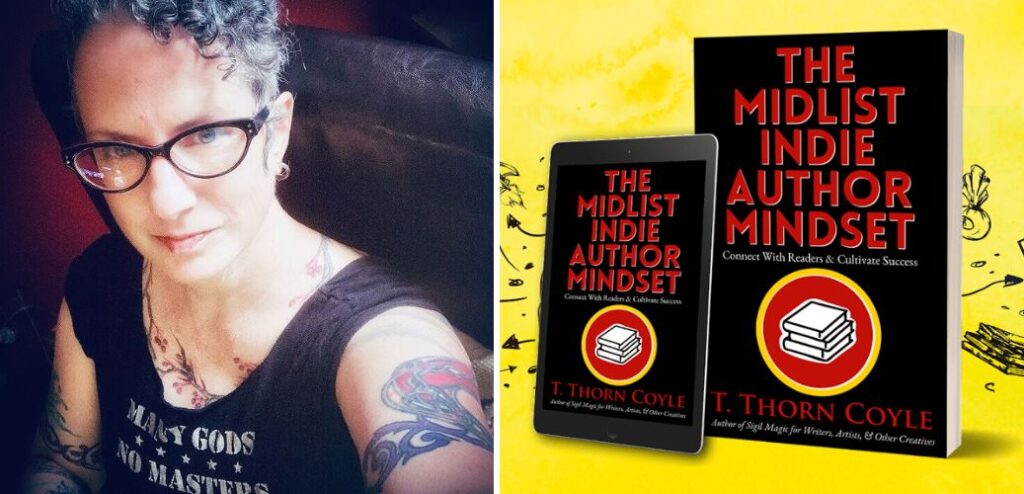
T. Thorn Coyle is the author of paranormal mystery, urban fantasy, alt history, epic fantasy, as well as nonfiction around magical practice. Their latest book is The Midlist Indie Author Mindse t.
You can listen above or on your favorite podcast app or read the notes and links below. Here are the highlights and the full transcript is below.
- What does it mean to be a mid-list author?
- How being weird can help you connect as more human
- Finding your sense of weird and letting it shine in your work
- Making marketing about connection and finding what works for you
- Marketing for Kickstarter in a short-term promotional window
- Tips for managing multiple Kickstarters per year
- Keeping readers engaged with your newsletter and social media
- Creating a tagline that portrays the message of your author business
You can find Thorn at ThornCoyle.com , and the Kickstarter for The Midlist Indie Author Mindset here.
Transcript of Interview with Thorn Coyle
Joanna: T. Thorn Coyle is the author of paranormal mystery, urban fantasy, alt history, epic fantasy, as well as nonfiction around magical practice. Their latest book is The Midlist Indie Author Mindset . So welcome back to the show, Thorn.
Thorn: Thanks so much. It's great to be back.
Joanna: Yes, I know. I had a look, and it's been six years since you were last on the show.
Thorn: That's a long time, especially in the indie publishing world.
Joanna: Yes. I mean, we're old school, which probably means we met like a decade ago!
Thorn: Yes, probably.
Joanna: Which is so funny. So let's assume people haven't listened to our episode from six years ago, and also, things have moved on.
Tell us a bit more about you and how you got into writing and publishing.
Thorn: Well, I was one of those people, you know, I've written since I was a tiny child, probably age five or six. I wrote poetry, I did journalism as a teenager, wrote for tattoo magazines in the 80s and 90s, and really wanted to write fiction.
I would practice writing fiction, and then I finally just gave up. I was the classic, I would labor over a short story for a year, and I would stall out three quarters into a novel.
I loved writing nonfiction also. That was easier for me, less of a challenge. So I got my first nonfiction major traditional publishing contract 20 years ago. I sold a book to Penguin, and I gave up fiction and focused on nonfiction, and traveling the world, and teaching for two decades.
Then fiction came back. Some characters showed up in my head one day, and I started writing fiction, and I started studying craft. Then I started seriously indie publishing, I decided I didn't want to go trad . My three first nonfiction books were all traditional published.
I didn't want to go traditional for fiction because I saw the struggles my friends were having with traditional publishing and my own struggles with traditional publishing. I started seriously indie publishing in 2017, and here we are today. I've got a big catalog now, and I just keep going.
Joanna: So what is a big catalog to you?
Thorn: I have probably, including short story collections, probably 30 books , which for me is a big catalog. I know for other people, that's a tiny catalog. It might even be more than 30 books now. I fail to keep track.
Joanna: I mean, it's also funny because you sounded slightly apologetic about 30 books, and I do this too. It's like, this is ridiculous because there are authors who write two books in their whole life!
Thorn: I know people like that. I certainly know a lot of traditional authors who only wrote a couple books. That's great, it's just a hard way to make a living.
Joanna: Yes, exactly. So let's get into the book, so The Midlist Indie Author Mindset . I feel like this word “midlist” probably means more in the traditional publishing world. So why don't we start with that.
What is the ‘mid-list,' and why use that concept? What does it mean?
Thorn: The reason I latched on to the concept of midlist—and you're right, it does come from traditional publishing. So I'll give a little background.
In traditional publishing, especially in like the 70s, 80s, and 90s, midlist authors were the bread-and-butter authors. They were middle class . They weren't best sellers, but they put out books people enjoyed year after year after year. They were the backbone of a lot of publishing for a long time.
So the bestsellers financed the non-sellers, the poor sellers, but the midlist just kept going, writing books people enjoyed . That slowly faded away as traditional publishing changed. It became harder and harder to make a living as kind of a middle class, midlist author.
The other thing about midlist authors is they had a big catalog because they just kept publishing year after year, usually genre fiction of some sort or another. They built up a catalog that people enjoyed, that in traditional publishing is called a backlist. We still use that terminology, but it's not really accurate for indie publishing.
In traditional publishing, frontlist is a brand-new book that they push for three months, that's what that means. Backlist is everything else. So we can just call it our catalog because as indie authors, we can relaunch. We can do whatever we want with all those books. They're not going to go away.
So I wanted to bring forth this concept of midlist into the indie world because so many people say, well, if I'm not making multiple six figures or seven figures, I'm a failure.
I believe it's possible for a lot of people to find ways to make a decent middle class living as writers.
It's a lot more attainable and sustainable than some of the tactics and techniques people use to grow to be multi-six, like high six-figure or seven-figure authors. It can feel discouraging, I think, to a lot of people when we see these success stories and think, well, I may as well win the lottery or get struck by lightning . That's how unattainable it feels.
I realized in my own life, I had to curtail some of my ambitions because of life circumstances. I realized what I really wanted was a slow, sustainable build and a long, sustainable career . If I can do it, I think a lot of people can do it.
Joanna: Yes, absolutely. The problem is the midlist is it's not a very sexy goal! It's not very catchy like, you know, six figure, seven figure.
As you say, it's more like the slow build, sustainable living, sustainable lifestyle, and things that actually give us a good life . Sometimes I feel like you have to be careful what you wish for. In the book, you talk a bit about your jet set lifestyle, you know, you used to travel a lot teaching. So what happened to that?
When did the romance disappear from that ‘jet set' lifestyle?
Thorn: So it was around 12 years ago that I really stopped wanting to travel all the time. I was traveling all over the world constantly, like, sometimes twice a month I was on an airplane.
It was wonderful. I met amazing people, I saw amazing places, and I was getting paid to do it. Unbeknownst to me, my undiagnosed chronic illness was getting worse, so that was starting to happen .
Also, I was just burning out. I was burning out on having to be this public figure, even though it was in a small sphere. I was burning out on the travel. I'll never forget, one time I came back from a trip, I crawled into bed, and said, “I'm done,” and I still had six months to a year's worth of trips booked.
So I just had to get through that time and then recalibrate and figure out what to do. That's when I did my major pivot. It also coincided when those characters showed up, and I started studying fiction again.
So yes, I burned out really badly, which I know a lot of people do and need to make career change. So I realized I still had those ambitions, and I took some of my ambitions into the indie writing sphere early on before I realized that was not going to be sustainable.
There were things people were doing that were all about the fast build. They were all about the spikes, you know, the huge income right away. I was trying to do that and failing, and I had to reassess and say, okay, what can I actually do? So I slowly figured it out for myself.
Joanna: Yes, and what do we want to do as well. It's interesting that the characters came back at the point at which you said you're kind of done with that life. So you opened up space in your mind for that.
I talked about this years ago when I made a decision to opt out of my career. I still had five more years of that IT consulting career, but I opted out of the career ladder. So I did what I needed to do to make the money and to do a good job for my boss, but I knew I was leaving.
That opened up the potential for what then came next. I feel like a lot of people don't realize that you almost need to make the space, like for you, for the characters to come back.
Thorn: Yes, and in the book, I talk about having a possibility mindset. That's what you're talking about.
Making space for what is possible, is really important.
It gets easy to just get on a hamster wheel and never just take a full breath and ponder, as you've said, what do I want? Not only what's right for me and what's sustainable or possible, but what does my heart want? What does my soul want? You know, what's interesting to me?
So I always try to invoke curiosity . I've invoked curiosity around writing fiction, but over the years, I've learned also to invoke curiosity about running a business.
That was my huge mindset shift.
When I decided to get curious about business instead of treating it like a loathsome, horrible task, it changed everything for me.
Joanna: Well, let's talk about that for a minute because I do remember having a conversation with you. I think we might even have talked about this on our last discussion on the show.
You're a strong activist, you have very strong principles, and money and capitalism were just things that you kind of hated. So you were pushing away money. Tell us how you got over that and how you reconciled this?
Thorn: I still don't like shareholder capitalism and the effects it has on the world, I can say that. For me, what I want to do is connect with people. That's always been my task as a creative. That's also my love as a business person.
So I need to run a sustainable business, and take interest in it, and figure out ways to engage with it in ways that are going to help me connect with people. That's all my business is.
I run a publishing company that's about connection.
So reframing that for myself, that it's not about who gets the most toys, it's about here's the world we live in, and what are my options for connecting with people and trying to make the world a more enjoyable, less horror-ridden place.
The other thing is, I'm always a proponent of culture change. One of the best ways to bring about culture change is capturing people's imaginations. So if I want to capture someone's imagination through my stories, I have to figure out a way to reach them with those stories, so I have to figure out how to run a business. So I think that's what helped me get curious.
Joanna: Yes, and I mean, to reach more readers, it's better to have a bigger engine in your business . I also remember you saying to me, “If I make a ton of money, I can always give it all away to causes that I care about.”
So that I think it's a really good reframe for people. It's to accept that if you make more money as an author, it's because you're selling more books, and you're reaching more people.
Thorn: Exactly, and people are excited about my books. People are excited about your books. People need fiction right now, and nonfiction too.
The world needs wonder. The world needs hope. If we can supply even a little bit of that for people, how awesome is that?
Joanna: Yes, and escapism as well. As we record this, I just binge watched the 3 Body Problem on Netflix, and I hadn't read the book. As soon as the series finished, I was like, right, I'm buying the book.
I learned today that The Three-Body Problem trilogy and Silent Spring , Rachel Carson's book, which they use in the series and is in his book, went to number one on Amazon because everyone's buying these books. I just thought that was brilliant, because again, it's such a resonant story at this time in history.
Like you say, these stories have power, and they connect minds. It's so powerful. I feel like sometimes we almost degrade writing fiction, like, oh, we should write something “more important” in inverted commas.
Thorn: That's also the great divide between high literary fiction and what we call genre fiction. We think, oh, my cozy paranormal mysteries are not important. Well, actually, my cozy paranormal mysteries are my best sellers because people need that escapism.
People need some comfort, you know. So why isn't comfort important? Why isn't enjoyment important?
I recently talked with author Meg Elison, and she really talks a lot about the importance of pleasure in life. I agree with her, we need pleasure. We need joy. Everything can't just be hard all the time because we won't make it through.
Joanna: Yes, absolutely. For me, going to bed with a book is still a big pleasure. Sometimes I'm just so tired, and I go to bed in the afternoon, and I'll read fiction. Other times I'll read nonfiction. I read your book on the plane coming back from 20 Books Seville. It's a great book.
I do want to come back to one point in the book. You say, “My readers love my work because I'm weird.” I talk about doubling down on being human , but I think it is easier said than done, especially in this world where there's a lot of advice around chasing tropes, or writing to market, or any of this.
How can authors find their own particular kind of weird and have the confidence to let it out into their work?
Thorn: Well, first of all, what comes most naturally to you? That's the main thing.
We often make the mistake that what comes most naturally to us, and what we really love and feels easier for us, isn't important. We think it's too ordinary, but what's ordinary for us, is extraordinary for something else. It feels ordinary to us because it's just part of us.
When we allow that voice to come forward, people respond to it because they're like, “Oh, that's an authentic voice. You're not putting something on. You're actually connecting with me, and I'm connecting with these characters.”
So I'll give you an example. I had been writing my alt history and kind of more serious urban fantasy, and I was in the middle of writing my epic action-adventure trilogy, and I needed a break. I had got a concussion and a brain injury.
I started writing my cozy paranormal mysteries, which are just bonkers. I did a Kickstarter for them, and I was very nervous because I thought, wow, this is really different and people aren't going to like it.
People came out of the woodwork to back that Kickstarter. My first reader for the cozy mysteries said, “Well, you know, cozy readers tend to be more traditional. They're not going to be into the fact that you have bisexual characters and transgender characters and all this stuff.” I thought, you know what —
I'm just going to market this as cozy mysteries for freaks and geeks, because I like cozy mysteries, and I'm weird.
Clearly, now I realize, oh, other people who are weird also want the comfort of cozy mysteries. They're not all traditional readers, you know.
So I was told very clearly, cozy readers are traditional. I said, I don't care, these are the books I want to write. Lo and behold, they found readers. It might take a little more time, which is why I talk about the slow build in the book. It might take more time, but you're going to find your readers.
Joanna: I do want to comment on this, because you're a super strong person, and you're very clear on your freaks and geeks side and your visual brand.
Let's just speak to the people who might not be that strong in their knowledge of what their weird is. So what about people who don't have that strong sense of “what is my weird?” How do we find that? How do we tap into that?
Thorn: Again, you mentioned earlier, making space. If we make space for ourselves and listen to our heart and what's most interesting to us , rather than listening to the clamoring voices trying to tell us what we should be doing, that's the first way through.
It's just to pause, go for a walk, meditate, ponder for a while, and think, what am I actually drawn to? Not what the marketers are telling me I should be drawn to. That's how to find ourselves and find our path forward, I think.
It just starts with listening and making space to listen.
Joanna: Yes, and it is really hard. I mean, the world is super noisy. You could just spend your time endlessly scrolling whichever social media it is, or doom reading the news, or whatever, and then your brain is full of all those things that it thinks that it should be interested in. So where do you find it? I mean, maybe it is in the books you read when nobody's watching?
Thorn: Yes, yes. I think that's brilliant. What are your so-called guilty pleasures? Then put all that in your writing.
Joanna: I mean, it's interesting, because I mentioned the 3 Body Problem again. So I say I don't read sci-fi, because I'm like, I'm not into aliens. Then watching the 3 Body Problem, I don't know why I didn't realize this before, it's not about the aliens. It's about the humans.
Thorn: It always is.
Joanna: It always is. The thing is, I really like reading horror. People are like, oh, why do you like horror? And I'm like, well, it's not about the monsters, it's about the humans. It's all just exactly the same, isn't it?
Thorn: We're all just trying to make sense of the world in our own way . It doesn't matter what genre it comes through. I think the joy of writing is we get to figure out the world. We either get to try to figure out the world we live in already, or we try to figure out what world we want to live in.
Joanna: Yes, and write that into whatever alt-world you're doing. It is interesting. Well, let's come to the marketing because you said in the book—
“I figured out how I market, not how other people market.”
That has a similar sense of finding your own path. So just talk about some of the things you tried but failed on, and what does work for you?
Thorn: Well, I'll go back to that word “connection.” Figuring out that for me marketing is about connection was helpful.
Actually, you helped me with this years ago. We were at some conference, and you said, “Oh, Thorn is great at content marketing.” I went, “I am?” I had no clue because I was just doing what I was doing. It was natural to me. Then I went, oh, okay, that's content marketing. I post what's interesting, it's still related to my world, and that's how I market.
The things that didn't work for me were early on. First of all, I didn't have a big enough catalog to do advertising for, but everyone said you have to do advertising. So I was taking the Amazon ads and Facebook ads classes, and they didn't work for me . Turns out all that advice at the time was really only useful for people in Kindle Unlimited, but they weren't telling me that.
The other thing that never worked for me were like, Facebook group takeovers, newsletter swaps, because I don't write the kind of urban fantasy these other people are writing. So doing a newsletter swap isn't going to really work because I don't know if your readers are going to really like my books.
Now, I eventually figured out that certain kinds of advertising works for that. Like if I did a free first in series and did the paid newsletters , I wasn't trying to target other people's readers, I was just targeting people who said, oh, we want urban fantasy, or we want cozy mystery.
I don't have to bring my entire catalog to these people. I'm bringing them one series. Then if they find the rest of my catalog, that's great.
The other thing that didn't work for me was that spike marketing. Trying to do promo stacking and get the big spikes and hitlist and all that, it was never going to work for me. That was all feeding the beast. Even for the writers that was working for, I don't think it was a long-term strategy.
So I had to figure out my long-term strategy, which was, how do I connect with my readers? Well, I do that through my newsletter. I do that through how I use social media. I do that now through things like Kickstarter.
So, over the last eight years, I've built up enough goodwill with my readers that they are so happy to share my stuff now. It also means when I do any paid advertising, I'm strategic about it, and it works . I'm not just throwing spaghetti at a wall.
Joanna: Interesting. You said the spike marketing hasn't worked for you, but Kickstarter is a short-term promotional window. So how are you doing that?
What kind of marketing are you doing within the three weeks this Kickstarter will run?
Thorn: That is a great point. So spike marketing for wide retailers didn't work for me. Spike marketing for direct sales does work for me. So I've built up all this goodwill through how I use my newsletter and how I connect on social media, so whenever I go to run a Kickstarter, people are like, “We are sharing your Kickstarter everywhere. We're so excited that you're doing this. We're backing you up just because we like your work.”
So I do market those, but I do it in the regular ways I do everything else. I use my social media platforms and send out notices in my newsletter. I don't do anything special for my Kickstarter. It all is organic for me.
Joanna: It just has a time limit. So you're basically just sending out some newsletters, and obviously, you've been doing some podcast interviews like this one.
Are you running any paid ads for your Kickstarter?
Have you found them useful?
Thorn: I spend like $20 on each campaign.
Joanna: That doesn't count!
Thorn: So I don't I don't do paid marketing. Some people do. I don't, and my Kickstarter campaigns all do really well.
Joanna: So how many Kickstarter campaigns have you done now?
Thorn: This one will be my ninth.
Joanna: Okay. So what's the kind of tempo? Because obviously we're talking here about the life that people want to live and designing your business around that.
What's the tempo of your Kickstarters in a year? How do you manage the different releases?
Thorn: I do three a year, and three years seems to work for me. I thought I was going to do four this year, and it was way too much. Partially because I ran a big-for-me Kickstarter campaign last year that brought in like twenty-five grand. Since I'm doing it all myself, it was big.
I had trouble with my printer, so it took a lot longer to fulfill than I wanted. So I'm like, okay, I need to take the fourth Kickstarter off my plate this year because everything just got backed up business-wise.
Three a year works for me because this is my full-time job. For people I know who it's their part-time job, they run one a year. It's a great way to make money for covers, pay for editors, and build a new audience.
This is the other thing I love about Kickstarter. About half of my backers come directly from Kickstarter, which is awesome. Then about half come from my world .
Joanna: Yes, from your audience. So when I do Spear of Destiny , it will be my first fiction Kickstarter. I've done two nonfiction. well memoir and then the writing nonfiction. I'm doing it under the same name.
This will be my first thriller, and I feel like I'm going to have to have really low expectations because I've spent the last 12 years training my fiction readers to buy eBooks on Amazon, basically. Do you feel like if you start with fiction, particularly where that's where a lot of our readers come from—
Does it take a while to retrain your readers to want other things?
Thorn: No, my readers love Kickstarter. I mean, some of them are confused by it, especially some of my older readers, and I have to do a minor amount of hand holding. But, no.
If I do a regular book launch on wide retailers, maybe a couple people will share it, maybe some people will buy it if I don't do actual advertising. My Kickstarters, people know it's time limited. It's an event, and they're excited to participate, so it spreads.
My readers do my marketing for me. Then the Kickstarter algorithm kicks in, and it does my marketing for me. It's actually much easier for me than launching something into the void on Amazon or Apple.
Joanna: I'm quite excited to see how it goes.
I do want to ask you, because you've mentioned your chronic illness, brain injury, and you talk about health issues in your book. When we do a Kickstarter, you've got the Kickstarter timing. What happens if then something happens in your health that you just can't do it? Or like you said, things get backed up?
How are you managing your health issues with the ups and downs of being an author?
Thorn: Well, it might seem strange to talk about health issues in a business book, but it felt important to me because everyone has something going on in their life. That is why I love this question.
I pad a lot of time into my fulfillment . I make this mistake all the time where I set out my year's goals when I'm feeling good, and then when I'm not feeling good, I have to deal with those goals, and I have to reassess them and pivot and rewrite my production schedule. I do it all the time.
Joanna: Yes, me too.
Thorn: With Kickstarter, I've learned to build in extra time for fulfillment . So if you think it's going to take two months to fulfill, tell people you'll fulfill in three to four months. If you think you're going to fulfill in four months, tell people you're going to fulfill in six months.
Just add in space, give yourself grace, and then if you fulfill early, that's awesome.
With the campaign I just finished fulfilling, I just told people, “Hey, here's what's happening with the printer. I'm having these issues. We're working on it.”
I just kept in communication, and people were very kind and happy just to be communicated with. So I was about a month behind in fulfillment, which is not the end of the world.
Joanna: Yes, these are books at the end of the day.
Thorn: Yes, seriously. So just communicate with people . First, build in extra space and time, build in a buffer. Then communicate clearly. People are very happy to be supportive. Most people want to be kind.
Joanna: Yes, I agree. So just coming back to your newsletter because you talked there about communication, and earlier you talked about it as the fundamental aspect of your marketing.
What do you do in your newsletter? What do you send out to people?
Because I feel like this is something that many authors struggle with.
Thorn: So, I used to barely use my newsletter. Coming out of traditional publishing, I never used a newsletter. I think that's changed now.
I send out a weekly missive about what I'm thinking about. I post a photo I take on one of my walks and just whatever thoughts I have. Then at the end of this 300-word missive, I do a line break and a small ad of, you know, “Here's my latest podcast I'm on,” or “Here's this book that is on sale or has just launched,” or “Here's my Kickstarter.”
So people come back week after week, and they know what they're going to get from me is just some thoughts from Thorn. Enough people like that, that some people actually pay me for it even though it's a free newsletter.
Joanna: That's on Substack?
Thorn: I was on Substack for three years. I just recently switched to Beehiiv.
Joanna: Because of the Nazis?!
Thorn: Yes, because of the Nazis. I mean, it's unfortunate that Substack decided to make those choices. I think Substack is still a better platform, but Beehiiv is getting there rapidly. So I have great hope.
So that's another thing I changed. I used to try to be on ConvertKit and do all the automated sequences that everyone said were best practices for newsletters. Those work for a lot of people—oh, segment your email list, do these sequences.
That marketing never worked for me, ever. So it made putting out my newsletter a chore. I said, I'm going to stop paying for this, I'm going to go to this free service, and I'm going to strip it down and say, here's what I'm doing. Every week, I'm going to send out thoughts with a tiny ad.
That was a huge shift for me. I started that just over three years ago, and people responded. People love the newsletter, people share the newsletter on social media, people reply, people send me long, thoughtful comments. So, again, it was figuring out how marketing worked for me.
Joanna: That's interesting, because I do have two newsletter lists. Actually, when you were talking there, I realized that's what I do on this show. My introduction includes the things I'm thinking about.
Many people are still listening to your interview, but some people did just come for the introduction. So that's actually exactly what you just said. You're doing it in writing, I'm doing it with talking.
Thorn: Yes, and I just let it be simple. It's like, okay, here's 300 words. I can write that in 15-20 minutes. Here's a photo. It works for me, and it works for my readers.
Joanna: It's just being human. It's a connection, like you said. I think this is the point we talked about earlier, everyone's quite smart these days around seeing through when things are a gimmick or they're not real. I still think that being human and the human connection is important.
So, let's come to social media. Again, I think we used to exchange things on Twitter when it was Twitter. A lot of people have moved on from some platforms.
I know you're a super ethical person, so what are you doing with social media now?
Thorn: Well, first of all, we just all have to figure it out. We live in this world, and I am not judging people who are on various platforms.
Losing Twitter was a great loss. Twitter was actually my favorite platform. I've tried to get off of Facebook ever since I've been on it, but people won't leave Facebook. Maybe they will eventually, but that has not been my experience.
Joanna: When we all die. When the old people die.
Thorn: Yes, when all the old people die. So, very simply, I only use my public Facebook page. I don't use my private page, except to track a few author groups. I do one post, same post, Facebook and Instagram, every morning. Usually it's a photo and a thought.
I'm on Mastodon, which strangely enough, Mastodon has no algorithm. It is my best place to get marketing traction because people know I'm showing up, making posts, even if it's just one simple post a day.
Then when I post something marketing-related, it gets shared. I get more shares on Mastodon than anywhere else, even though it has no algorithm. Then I'm on Bluesky, which frankly, is useless to me.
Joanna: I did try and get on Threads, and it went toxic so fast.
Thorn: Threads is horrific. The comments. I'm like, oh, my gosh, the comments on Threads are awful.
Joanna: It's like all the toxicity from Twitter ended up on Threads.
Thorn: Yes, it did. It did.
My social media strategy is very simple. I do one simple post a day. Then I try to remember to occasionally do a marketing post.
Then when I'm running a Kickstarter, though, I do a more marketing-related post pretty much every day during my Kickstarter.
Since I'm not doing that constantly, people seem supportive of it. They're not always getting bombarded by “buy my book” from me. So they're really happy to support when I'm running a Kickstarter. They're really happy to do things like share my newsletter when I post my newsletter on social media, things like that.
Joanna: Again, you bring in the things you care about , and sometimes that is about protests, or art, or tattoos, or gender issues. I mean, you do just share quite all over the place, I think.
Thorn: I do. I try to be uplifting as much as possible . If I'm posting about something difficult, I always try to have a call to action that people can actually do. I'm not just on there complaining.
My rule for public discourse is I try to be signal and not noise. There's too much noise out there. So what is my signal that I'm trying to put out to reach people?
Yes, my presence can feel all over the map, and I have felt that about myself. Like, you know, buy my books, but I'm also talking about magic, but here's a flower that I saw on my walk, then here is this social justice thing that's happening. But truly, that's all me, and that is all in my books, too.
Joanna: That's the point I was trying to make. I didn't mean you were all over the place. I meant— You talk about all the things that go into your books.
Like you are political, and your books are political. So if people don't want to do politics then, you know, they're not your person, but people who love your politics will love your books. So I think that's what I was trying to get at. You are very, I hate the word authentic, but you are pretty authentic.
Thorn: I can't not be, which is why I just had to figure it out for myself. What's interesting to me is at this point in the indie author world, I'm hearing this from a lot more people.
A lot of people right now are reassessing how they've been marketing, and what they've been writing, and what they want their careers to look like.
I think as a whole in the indie author world, we're taking a step back right now and saying, how do we want to move forward? For me, it always just had to be, be myself.
When I first started publishing fiction, everyone said you need to do it under a pen name because you're going to pollute your Amazon also-boughts. I'm like, I don't care. I have spent decades building up goodwill with people with my name. I'm just going to write fiction under this name.
Well, lo and behold, Amazon also-boughts quickly went away. The Amazon algorithm changes every six months to a year.
Joanna: I think it changes every week.
Thorn: Probably. So people have figured out, oh, we can't just chase the algorithm anymore. It doesn't work long term.
So, I came up with a tagline for my author business, and it's, “ Magic is real, and justice is worth fighting for. ” So people know that's what they're going to get from me, no matter what I'm writing or talking about. A sense of magic and a sense of justice.
Joanna: A lot of people want a tagline. I have tried, and I think I've even asked you about this before as well. I still don't have a tagline. So I mean—
Did it take you a long time to get to that tagline, or has it always been very clear for you?
Thorn: It took me a little while, but it didn't take me that long. I just, again, paused and assessed and said, what do I think my through line is? What are the strongest threads in my work? What are the strongest threads I want to put out in the world? That's where it came from.
So, for you, I think you're really interested in human emotion. I think you're obviously interested in the shadow. You're interested in what makes us tick.
I think that also includes your author stuff. Your author books, over time, I think have grown to include more and more of your interest in human psychology and philosophy.
Joanna: Maybe that's part of it. You know, we're talking as two people who've been doing this a while now, and I feel like that's another thing.
Also around your book and talking about the slow growth, look, some of this stuff takes time. None of this appears overnight. I get people sometimes that are trying to figure all this out, and they haven't even finished their first book yet.
Thorn: Yes. Yes.
Joanna: So patience, I guess.
Thorn: Patience, and patience is hard. Every new writer wants to be an overnight success. The thing I'll tell you is I've seen people who have been overnight successes and that puts a lot of pressure on the work.
I think it makes it harder to build a long-term career for most people. You know, you start thinking, what if my next book isn't as good? What if people don't like it? Instead of just giving yourself the freedom.
Frankly, no one knowing who you are is a huge boon to your creativity because you can do whatever you want and find your voice over time and slowly build an audience over time.
Kristine Kathryn Rusch says we build our career one reader at a time . I think doubling down on that is helpful. I don't have to reach 100,000 people or even 1000 people. I want to reach one person. That's where it starts.
Joanna: Absolutely. Now there are loads of great tips and things in the book. It's really meaty. It's got lots in it.
Tell people about the Kickstarter, where they can find it, and when it's running.
Thorn: So the Kickstarter launches April 16, and it will run through the first part of May. I will have some checklists for midlist mindset changes. I will have some coaching options for people who really want to say, “Hey, how do I shift my mindset around this stuff? I'm struggling with this area of my writer business.”
So it's not going to be coaching around like specifics on marketing, it's all going to be mindset coaching. Then of course, I'll have the eBooks and print books and maybe some other surprises.
Joanna: Fantastic.
Where else can people find you online?
Thorn: ThornCoyle.com .
Joanna: Brilliant. Well, thanks so much for your time, Thorn. That was great.
Thorn: Thanks again for having me back on the show.

Reader Interactions
Leave a reply cancel reply.
Your email address will not be published. Required fields are marked *
Notify me of followup comments via e-mail
This site uses Akismet to reduce spam. Learn how your comment data is processed .
Connect with me on social media
Sign up for your free author blueprint.

Thanks for visiting The Creative Penn!

IMAGES
VIDEO
COMMENTS
Steering the Craft by Ursula K. Le Guin - Many writers consider this to be their bible on craft and storytelling. Writing Down the Bones: Freeing the Writer Within by Natalie Goldberg - A favorite of many writers, this book takes an almost spiritual approach to the art, craft, and experience of writing.
4. Madness, Rack, and Honey by Mary Ruefle. The collected lectures of poet and professor Mary Ruefle present us with an erudite inquiry into some of the major aspects of a writer's mind and craft.
The professor of creative writing at UEA says Joseph Conrad got it right when he said that the sitting down is all. He chooses five books to help aspiring writers. 1 Becoming a Writer by Dorothea Brande. 2 On Becoming a Novelist by John C. Gardner. 3 On Writing: A Memoir of the Craft by Stephen King.
Creative Writing Books Creative Writing Books: books on the craft of writing, including fiction, poetry, and creative non-fiction. flag All Votes Add Books To This List. 1: Bandersnatch: C.S. Lewis, J.R.R. Tolkien and the Creative Collaboration of the Inklings by. Diana Pavlac Glyer (Goodreads Author) 4.27 avg rating — 1,172 ratings ...
Mark David Gerson Author. William H. Coles Author. Uta, Chris, and Alex Frith Author. Jesse Schell Author. +39. 45 authors created a book list connected to creative writing, and here are their favorite creative writing books. Shepherd is reader supported. When you buy books, we may earn an affiliate commission .
This blog post brings together some brilliant books on creative writing, including The Agony and the Ego, a 1993 anthology edited by Clare Boylan.In her introduction, Boylan makes an interesting ...
by Anne Lamott. Bird by Bird: Some Instructions on Writing and Life by Anne Lamott is a beloved book on creative writing that offers practical advice and humorous insights for aspiring writers. Lamott shares her personal experiences and wisdom on the creative process, tackling self-doubt, and finding inspiration.
Creative Writing Books Showing 1-50 of 5,563 On Writing: A Memoir of the Craft (Mass Market Paperback) by. Stephen King (Goodreads Author) (shelved 112 times as creative-writing) avg rating 4.34 — 288,013 ratings — published 2000 Want to Read saving… Want to Read; Currently Reading ...
by Pat Pattison. Writing Better Lyrics has been a staple for songwriters for nearly two decades. Now this revised and updated 2nd Edition provides effective tools for everything from generating ideas, to understanding the form and function of a song, to fine-tuning lyrics. Paperback. $20.99.
This free and open access textbook introduces new writers to some basic elements of the craft of creative writing in the genres of fiction, poetry, and creative nonfiction. The authors—Rachel Morgan, Jeremy Schraffenberger, and Grant Tracey—are editors of the North American Review, the oldest and one of the most well-regarded literary magazines in the United States. They've selected ...
So for starters, here are our top 10 books about writing: On Writing by Stephen King. The Kick-Ass Writer by Chuck Wendig. Dreyer's Englis h by Benjamin Dreyer. The Elements of Style by Strunk, White, and Kalman. The Story Grid by Shawn Coyne. A Swim in a Pond in the Rain by George Saunders. Bird by Bird by Anne Lamott.
This pioneering book introduces students to the practice and art of creative writing and creative reading. It offers a fresh, distinctive and beautifully written synthesis of the discipline. David Morley discusses where creative writing comes from, the various forms and camouflages it has taken, and why we teach and learn the arts of fiction ...
English and Creative Writing Books Showing 1-9 of 9 The Taming of the Shrew (Mass Market Paperback) by. William Shakespeare (shelved 1 time as english-and-creative-writing) avg rating 3.75 — 170,909 ratings — published 1593 Want to Read saving… Want to Read; Currently Reading ...
ISBN: 9780205750344. Publication Date: 2010-01-03. "'Writing Fiction' explores the elements of fiction, providing practical writing techniques & examples. Written in a tone that is personal & non-prescriptive, this book encourages students to develop proficiency through each step of the writing process.
Here's how our contest works: every Friday, we send out a newsletter containing five creative writing prompts. Each week, the story ideas center around a different theme. Authors then have one week — until the following Friday — to submit a short story based on one of our prompts. A winner is picked each week to win $250 and is highlighted ...
Department of English Barker Center 12 Quincy Street Cambridge, MA 02138 Hours: M-F 9:00 am-5:00 pm Phone: 617-495-2533 Fax: 617-496-8737 [email protected]
US$15.99. 40. 80. 120. Filter by Age. Filter by Author. We are the leading UK independent publisher of children's books. Our books are available worldwide. Browse our catalogue and find out where to buy Usborne books.
On this website you can browse and buy Usborne books in English, French, German, Spanish, Catalan, Italian, Dutch, Korean and Brazilian Portuguese. ... Creative Writing Book. Age: 8+ RRP £9.99. My First Story Writing Book. Age: 6+ RRP £7.99. Write Your Own Adventure Stories. Age: 7+
avg rating 3.82 — 3,820 ratings — published 1977. Books shelved as english-writing: The Elements of Style by William Strunk Jr., On Writing Well: The Classic Guide to Writing Nonfiction by William Zinsse...
This guide is intended to help you navigate resources for English and Creative Writing at Augustana College. Here you will find information about finding research articles, books, and other helpful resources. This guide can help you: Start the research process. Identify databases specific to English and creative writing.
On this website you can browse and buy Usborne books in English, French, German, Spanish, Catalan, Italian, Dutch, Korean and Brazilian Portuguese. ... Creative Writing Book. Age: 8+ £9.99. My First Story Writing Book. Age: 6+ £7.99. Write Your Own Adventure Stories. Age: 7+ £8.99. Write and Draw Your Own Comics. Age: 7+
Today's show is sponsored by ProWritingAid, writing and editing software that goes way beyond just grammar and typo checking. With its detailed reports on how to improve your writing and integration with Scrivener, ProWritingAid will help you improve your book before you send it to an editor, agent or publisher.Check it out for free or get 25% off the premium edition at www.ProWritingAid.com ...
This inspiring book will unlock children's ideas for writing stories, poems, comics, blogs, reviews, movie scripts and more. As well as activities for writing compelling story outlines, dialogue and lively characters, there are tips for writing horror stories, romance and thrillers, and even shock journalism. With lots of space to write in - but no scary blank pages.